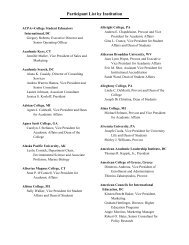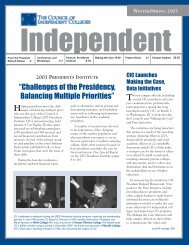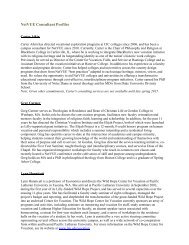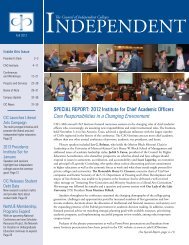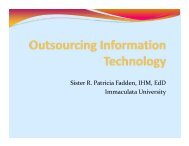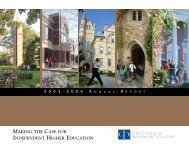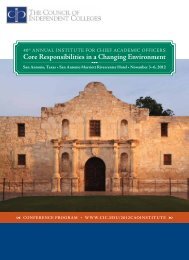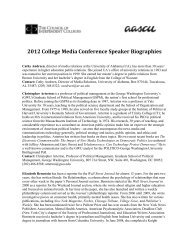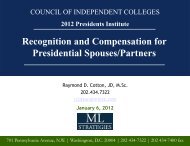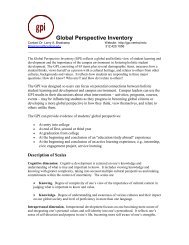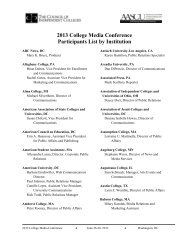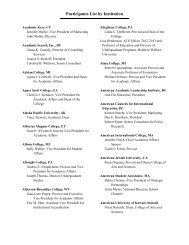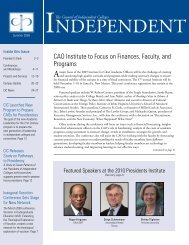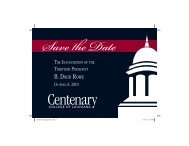Annual Report 1998-1999 - The Council of Independent Colleges
Annual Report 1998-1999 - The Council of Independent Colleges
Annual Report 1998-1999 - The Council of Independent Colleges
You also want an ePaper? Increase the reach of your titles
YUMPU automatically turns print PDFs into web optimized ePapers that Google loves.
CIC<br />
COUNCIL OF INDEPENDENT COLLEGES<br />
Serving College Leaders<br />
ANNUAL REPORT <strong>1998</strong>-<strong>1999</strong>
Cover photographs: Top op (left to right): Sister Joel Read, president <strong>of</strong> Alverno College; Bryant L. Cureton, president <strong>of</strong><br />
Elmhurst College; Paul Dovre, president (retired) <strong>of</strong> Concordia College at Moorhead<br />
Middle (left to right): R. Thomas Williamson, president <strong>of</strong> Westminster College (PA); Wanda D. Bigham, president <strong>of</strong><br />
Huntingdon College; Sister Mary Francilene Van De Vyver, president <strong>of</strong> Madonna University<br />
Bottom (left to right): D. Duane Cummins, president <strong>of</strong> Bethany College (WV); Shirley H. Showalter, president <strong>of</strong><br />
Goshen College; Douglas M. Orr Jr., president <strong>of</strong> Warren Wilson College<br />
Table <strong>of</strong> Contents photographs (top to bottom): Richard Pfau, president <strong>of</strong> Illinois College; Margaret A. McKenna,<br />
president <strong>of</strong> Lesley College; Joseph R. Fink, president <strong>of</strong> Dominican College <strong>of</strong> San Rafael; George K. Brushaber,<br />
president <strong>of</strong> Bethel College and Seminary (MN)
Serving College Leaders<br />
Table <strong>of</strong> Contents<br />
A Message from the Chairman 2<br />
A Message from the President 3<br />
<strong>Annual</strong> <strong>Report</strong> <strong>1998</strong>-<strong>1999</strong> 4<br />
<strong>Annual</strong> Programs 5<br />
Special Programs and Projects 9<br />
Communications 15<br />
Additional Programs and Initiatives 16<br />
Organizational Capacity 16<br />
Awardees <strong>1998</strong>-<strong>1999</strong> 18<br />
A Special Message from Allen Splete 19<br />
Resource Development 20<br />
Financial Statement 21<br />
Board <strong>of</strong> Directors 22<br />
CAPHE Advisory Board 23<br />
Task Forces 24<br />
Members 25<br />
Associate Members 30<br />
CIC Staff 31<br />
CIC Contact information 32
A Message from the Chairman<br />
It is a pleasure to once again<br />
report that the <strong>Council</strong> <strong>of</strong><br />
<strong>Independent</strong> <strong>Colleges</strong> has had<br />
an exceptional year in service to<br />
private higher education. <strong>The</strong><br />
pages that follow summarize CIC’s specific<br />
accomplishments during <strong>1998</strong>-<strong>1999</strong>.<br />
<strong>The</strong> power <strong>of</strong> CIC is evident in the sharing <strong>of</strong><br />
ideas, problem solving, and support that member<br />
institutions derive in myriad ways. <strong>The</strong>se services<br />
come via presentations at meetings, through campus<br />
work in projects, from consultants suggested by<br />
CIC, from publications and CIC’s Web site, and<br />
through the <strong>Council</strong>’s other services.<br />
CIC also <strong>of</strong>fers a powerful intangible benefit,<br />
which is manifested in a network <strong>of</strong> personal contacts.<br />
As a college president, and earlier as a college<br />
dean, I have long turned to colleagues I know<br />
through CIC for ideas, inspiration, answers to problems,<br />
and more.<br />
Our faculty, IT staff, and other administrators find<br />
similar benefits in CIC programming tailored to their<br />
campus roles. <strong>The</strong> relationships I have developed<br />
through CIC have played an important role in my<br />
own pr<strong>of</strong>essional development, and in turn have had<br />
a very positive impact at the institutions I have served.<br />
Indeed, there is great power in our work together<br />
through CIC.<br />
I have announced my retirement from the presidency<br />
effective June 1, 2000. During the coming<br />
year I will also complete my term as chairman <strong>of</strong> the<br />
CIC Board <strong>of</strong> Directors. It has been a privilege for<br />
me to serve on CIC’s board, and an honor to serve<br />
most recently as chair. Thanks to the good work <strong>of</strong><br />
volunteers throughout CIC and that <strong>of</strong> Allen Splete<br />
and his staff, I can look back with satisfaction at what<br />
we have accomplished. I can also look forward confidently,<br />
knowing that the organization is stronger<br />
today than at any other point in its 45-year history.<br />
CIC is more than ready to help private colleges<br />
and universities in the years ahead.<br />
Thank you all for this opportunity to be <strong>of</strong> service.<br />
With CIC’s continued assistance, I know that<br />
our sector will continue to sustain its major contributions<br />
to high quality education.<br />
Harold M. Kolenbrander<br />
President, Mount Union College<br />
Chairman, CIC Board <strong>of</strong> Directors<br />
2<br />
<strong>Council</strong> <strong>of</strong> <strong>Independent</strong> <strong>Colleges</strong>
A Message from the President<br />
As Harold Kolenbrander, our<br />
board chair, states on the<br />
facing page, CIC had an<br />
outstanding year in <strong>1998</strong>-<strong>1999</strong>.<br />
A few highlights <strong>of</strong> the year<br />
merit mention here:<br />
Ø CIC once again reached a record level <strong>of</strong><br />
membership—currently, 468 colleges and<br />
universities are part <strong>of</strong> CIC. Some 99% <strong>of</strong> our<br />
members renewed their participation in CIC<br />
for the year.<br />
Ø Our financial position is strong overall, and<br />
we ended <strong>1998</strong>-<strong>1999</strong> with a modest surplus.<br />
Ø Our annual conferences for presidents and<br />
chief academic <strong>of</strong>ficers this year were both<br />
superb; each meeting drew some <strong>of</strong> the best<br />
participant evaluations ever. We conducted a<br />
successful National Institute on cultures <strong>of</strong><br />
learning, for campus teams. Our annual<br />
conversation between presidents and foundation<br />
<strong>of</strong>ficers, in its 11th year, was one <strong>of</strong> the<br />
best we’ve ever had. We experimented successfully<br />
with a new type <strong>of</strong> technology workshop—a<br />
campus-based, hands-on, “traveling<br />
workshop”—that was enthusiastically received<br />
by five campuses.<br />
Ø We collaborated with CASE to sponsor a<br />
workshop for the president and the chief<br />
advancement <strong>of</strong>ficer.<br />
Ø We continued to develop a concept <strong>of</strong><br />
Presidential Forums—small, regular, regional<br />
meetings for college leaders—that will be<br />
launched in the fall <strong>of</strong> <strong>1999</strong>. We secured<br />
funding for a monograph <strong>of</strong> essays on leadership<br />
by CIC presidents.<br />
Ø We made grants totaling nearly $750,000<br />
to 72 colleges and universities.<br />
Ø Staff visited a total <strong>of</strong> 85 campuses.<br />
Ø We saw good progress in several major<br />
projects, especially our programs on “Faculty<br />
Roles,” “Implementing Urban Missions,” “Engaging<br />
Communities and Campuses,” and “Enabling<br />
Leadership in Information Technologies.”<br />
We owe our record <strong>of</strong> achievement during <strong>1998</strong>-<br />
<strong>1999</strong> to many friends <strong>of</strong> CIC. Specifically, I want to<br />
thank our Board <strong>of</strong> Directors, for their thoughtful<br />
guidance; our sponsors, for both grant support and<br />
programming ideas; the volunteers and speakers who<br />
add value to our meetings; and the CIC staff, for<br />
their dedication and hard work in advancing our<br />
goals. I especially thank Harold Kolenbrander for<br />
his good counsel and encouragement.<br />
I am privileged to serve the nation’s private liberal<br />
arts colleges and universities. <strong>The</strong>y are precious national<br />
assets that enrich our society. Thank you for<br />
your continued support.<br />
Allen P. Splete<br />
President<br />
<strong>Council</strong> <strong>of</strong> <strong>Independent</strong> <strong>Colleges</strong><br />
<strong>Annual</strong> <strong>Report</strong> <strong>1998</strong>-<strong>1999</strong><br />
3
<strong>The</strong> <strong>Council</strong> <strong>of</strong> <strong>Independent</strong> <strong>Colleges</strong> is an association <strong>of</strong><br />
independent colleges and universities working together to:<br />
Ø support college leadership,<br />
Ø advance institutional excellence, and<br />
Ø enhance private higher education’s contributions<br />
to society.<br />
To fulfill its mission, CIC provides ideas, resources, and services<br />
that assist institutions in improving leadership expertise,<br />
educational programs, administrative and financial performance,<br />
and institutional visibility.<br />
<strong>Council</strong> <strong>of</strong> <strong>Independent</strong> <strong>Colleges</strong>
Serving College Leaders<br />
<strong>Annual</strong> <strong>Report</strong> <strong>1998</strong>-<strong>1999</strong><br />
CIC serves the leaders <strong>of</strong> independent, liberal arts<br />
colleges and universities—and by extension, the institutions<br />
themselves—with a full complement <strong>of</strong><br />
services. Much <strong>of</strong> CIC’s work takes place through<br />
conferences and national projects. We will report here<br />
first on those two areas. Subsequent pages detail additional<br />
CIC initiatives, communications, award recipients,<br />
resource development, membership,<br />
our budget, and volunteers<br />
who assist our work.<br />
Seasons <strong>of</strong><br />
<strong>Annual</strong> Programs<br />
CIC’s annual conferences and workshops<br />
provide pr<strong>of</strong>essional development,<br />
opportunities to discuss critical<br />
issues, and time for personal renewal<br />
for college leaders, administrative staff,<br />
and faculty.<br />
Presidents Institute. CIC’s premier<br />
event, the largest annual meeting solely<br />
<strong>of</strong> private college presidents in the country,<br />
provides college and university leaders with ideas,<br />
personal support and networking, and recreation and<br />
relaxation. This year’s conference, held January 4-7,<br />
<strong>1999</strong> at Marco Island, Florida, explored “Seasons <strong>of</strong><br />
the Presidency.”<br />
Three plenary sessions explored related aspects <strong>of</strong><br />
leadership. Consultant Donald Norris suggested that<br />
society is riding “the cresting tidal wave <strong>of</strong> the knowledge<br />
age.” Institutions know they have to adapt to<br />
meet the evolving needs <strong>of</strong> learners, Norris said, but<br />
find change difficult. To expedite change, Norris argued<br />
for “planning from the future backward.” He<br />
also suggested that college leaders not get bogged<br />
down in wholesale efforts to change institutional<br />
culture, but focus instead on incremental changes—<br />
expeditionary forays from departments or programs.<br />
“That doesn’t mean you have to have all the answers,”<br />
Norris told the presidents. “It means<br />
serving as a coach, mentor, and convener<br />
to help your campus move into<br />
the future.”<br />
Conference keynoter Frances<br />
Hesselbein, from the Peter F. Drucker<br />
Foundation for Nonpr<strong>of</strong>it Management,<br />
observed that leadership is more<br />
about “how to be” than about “how<br />
to do it.” She said successful leaders<br />
have four core capacities: they focus on<br />
mission, communicate vision, have integrity,<br />
and engage the institution in<br />
moving forward. Effective leaders are<br />
also comfortable with “planned abandonment,” she<br />
said—they have the skills, judgment and wisdom to<br />
help us abandon old ideas and habits as we move on<br />
to new opportunities.<br />
Another plenary speaker, Robert Kelley, suggested<br />
that presidents seek many perspectives in decisionmaking.<br />
Staff people down the ranks within an organization<br />
can <strong>of</strong>fer many good perspectives to guide<br />
change, Kelley said. Especially when times are uncertain,<br />
he said, leaders should call on leadership skills<br />
the Presidency:<br />
Strategies for Success<br />
This year’s Presidents<br />
Institute, held January 4-7,<br />
<strong>1999</strong> at Marco Island,<br />
Florida, explored “Seasons<br />
<strong>of</strong> the Presidency.”<br />
<strong>Annual</strong> <strong>Report</strong> <strong>1998</strong>-<strong>1999</strong><br />
5
down into the organization, and to develop<br />
“followership” skills.<br />
While snowstorms across the country foiled the<br />
expected record turnout, nearly half the member<br />
presidents <strong>of</strong> CIC still managed to attend. End-<strong>of</strong>meeting<br />
evaluations show that participating presidents<br />
drew much value from the conference.<br />
A highly respected two-day workshop for new<br />
presidents and substantive programming for presidential<br />
spouses were also part <strong>of</strong> the conference. Sponsors<br />
provided a record amount <strong>of</strong> funding<br />
for the <strong>1999</strong> institute.<br />
Deans Institute. In early November<br />
<strong>1998</strong>, CIC’s chief academic <strong>of</strong>ficers had<br />
their first international meeting, in<br />
Toronto, Canada. <strong>The</strong> theme for the<br />
26 th annual Deans Institute was <strong>The</strong><br />
Changing Role <strong>of</strong> the Academic Vice<br />
President. Forty-six percent <strong>of</strong> our<br />
member institutions were represented.<br />
<strong>The</strong> meeting drew some <strong>of</strong><br />
the most positive participant evaluations<br />
ever recorded.<br />
Institute keynoter Peter Ewell told<br />
the deans that higher education is in<br />
the midst <strong>of</strong> a “defining decade” as significant as<br />
the boom years after World War II. Ewell, senior<br />
associate at the National Center for Higher Education<br />
Management, said that private colleges and<br />
universities today face developments that are “both<br />
threatening and liberating.” How well liberal arts<br />
institutions will survive and thrive, Ewell believes,<br />
depends a lot on how creative they are willing to<br />
be. Ewell structured his remarks around four “diverse<br />
and powerful” trends in higher education—<br />
today’s “revolution” in teaching and learning; “new<br />
demands for higher order skills”; the impact <strong>of</strong><br />
technology, and the public call for “sound and<br />
Expanding Portfolios<br />
<strong>The</strong> Changing Role <strong>of</strong> the<br />
Academic Vice President<br />
In early November <strong>1998</strong>,<br />
CIC’s chief academic<br />
<strong>of</strong>ficers had their first<br />
international meeting, in<br />
Toronto, Canada.<br />
certified credentials.” <strong>The</strong>se forces, he believes,<br />
“have the potential to break down virtually all<br />
that we find familiar.”<br />
A plethora <strong>of</strong> break-out sessions gave CAOs some<br />
new ideas and additional background on legal issues,<br />
technology, budgeting, fund raising, working<br />
with trustees, teacher education accreditation, evaluation<br />
<strong>of</strong> department chairs, and many other topics.<br />
<strong>The</strong> closing plenary session, a highly interactive<br />
investigation <strong>of</strong> personal “ways <strong>of</strong> knowing” with Harvard’s<br />
Robert Kegan, rated near the highest ever<br />
among Deans Institute sessions.<br />
In addition to forums for sharing expertise,<br />
the meeting also featured a number<br />
<strong>of</strong> ways in which CAOs worked together<br />
to develop ideas to improve the<br />
way they do business. For example, six<br />
“working groups” <strong>of</strong> deans met three<br />
times during the institute for focused<br />
dialogues on faculty workload, technology<br />
in the classroom, student learning,<br />
and other topics.<br />
An ancillary program provided pr<strong>of</strong>essional<br />
development for new deans,<br />
with seasoned chief academic <strong>of</strong>ficers as<br />
faculty. As has been the case for many years, the<br />
New Deans Workshop drew rave reviews.<br />
During the course <strong>of</strong> the meeting, another track<br />
<strong>of</strong>fered sessions for spouses <strong>of</strong> deans. More than<br />
50 deans’ spouses took part in programming<br />
geared toward their unique role.<br />
Conversation Between Foundation Officers and<br />
College and University Presidents. In 1988, CIC<br />
invited foundation <strong>of</strong>ficers and institutional presidents<br />
to a meeting to discuss issues important to<br />
private colleges and universities. <strong>The</strong> meeting was<br />
designed not as an opportunity for grant solicitation,<br />
but rather for open, frank dialogue. <strong>The</strong> con-<br />
6<br />
<strong>Council</strong> <strong>of</strong> <strong>Independent</strong> <strong>Colleges</strong>
cept proved so popular that the meeting has been<br />
held every year since then.<br />
This year’s Conversation was titled Lessons Learned,<br />
Opportunities Missed and took place October 6, <strong>1998</strong>,<br />
in New York City. Nearly 80 CIC member-institution<br />
presidents and more than a dozen leaders <strong>of</strong><br />
major foundations got together to talk about a range<br />
<strong>of</strong> issues. <strong>The</strong> meeting was designed to both identify<br />
areas where foundations and colleges might have<br />
worked more productively in the past,<br />
and to find common ground for future-focused<br />
discussions. <strong>The</strong> dialogue<br />
that resulted was honest and instructive.<br />
<strong>The</strong> conversation began with discussions<br />
led by foundation <strong>of</strong>ficers.<br />
John Mason, then head <strong>of</strong> the<br />
Monsanto Fund, and Anita Pampusch<br />
from the Bush Foundation, chaired two<br />
conversations on diversity. Philanthropist<br />
Eugene Lang and Hildy Simmons,<br />
managing director <strong>of</strong> <strong>The</strong> Booth Ferris<br />
Foundation, collaborated to lead sessions<br />
on civic education. Technology<br />
and institutional collaboration were<br />
two other major themes, featuring <strong>of</strong>ficers<br />
from BellSouth, <strong>The</strong> Andrew Mellon Foundation,<br />
<strong>The</strong> Pew Charitable Trusts, and SCT Corporation.<br />
In the afternoon, four CIC presidents synthesized<br />
what they had heard in the break-out meetings. Out<br />
<strong>of</strong> the dialogues on civic education, for example, there<br />
rose a sense that colleges need to integrate citizenship<br />
into the core curriculum, not just add it on.<br />
<strong>The</strong>re was a general call for foundations and colleges<br />
to develop more programs collaboratively.<br />
Representatives <strong>of</strong> both campuses and philanthropies<br />
said that each group needs to better understand<br />
the other’s motivations. Presidents urged foundations<br />
to fund creative new responses to problems,<br />
In October, nearly 80 CIC<br />
member-institution presidents<br />
and more than a dozen<br />
leaders <strong>of</strong> major foundations<br />
got together to talk about a<br />
range <strong>of</strong> issues.<br />
not just tried and tested programs, and to have a<br />
longer-term commitment to problems. Several presidents<br />
urged foundation <strong>of</strong>ficers to look beyond the<br />
“usual candidates” to consider lesser-known institutions<br />
for grants.<br />
National Institute. Every four or so years, CIC<br />
brings together campus teams to address and discuss<br />
a topic <strong>of</strong> emerging importance for private<br />
colleges and universities. Our latest national institute<br />
took part in June in St. Louis,<br />
around the theme Creating Cultures<br />
<strong>of</strong> Learning (see page 8).<br />
Information Technologies Workshop.<br />
Another popular CIC <strong>of</strong>fering,<br />
the annual Information Technology<br />
workshop, provides information and<br />
ideas about improving learning and institutional<br />
management through the<br />
use <strong>of</strong> information technologies.<br />
Participants at the <strong>1999</strong> program,<br />
the tenth annual workshop, explored<br />
a theme <strong>of</strong> <strong>The</strong> Evolving Web: How<br />
Private <strong>Colleges</strong> Are Making It Work.<br />
<strong>The</strong> workshop, held March 25-27 in<br />
Pittsburgh, was co-sponsored by<br />
EDUCAUSE. Major speakers included Richard<br />
Katz <strong>of</strong> EDUCAUSE, CIC Senior Associate Edward<br />
Barboni, and Michael Zastrocky from <strong>The</strong><br />
Gartner Group.<br />
Traveling Workshops. We tried a new concept for<br />
program delivery this year—hands-on sessions held<br />
on individual campuses to assist faculty to begin to<br />
use the Web in courses. Five institutions brought<br />
the workshop to their campus, where experts led<br />
large groups <strong>of</strong> faculty through a program entitled<br />
Planning, Building, and Maintaining Web Sites That<br />
Enhance Student Learning.<br />
<strong>Annual</strong> <strong>Report</strong> <strong>1998</strong>-<strong>1999</strong><br />
7
National Institute on the Future <strong>of</strong> <strong>Independent</strong> Higher Education<br />
CIC conferences usually focus on a campus role—<br />
that <strong>of</strong> the president, for example, or <strong>of</strong> the chief<br />
academic <strong>of</strong>ficer. Experience tells us, though, that<br />
good ideas and the stimulus for productive institutional<br />
change can also come from conferences that<br />
engage a cross-section <strong>of</strong> campus roles and responsibilities.<br />
Working together at CIC institutes, campus<br />
teams develop ideas and plans that result in meaningful<br />
institutional changes. CIC institutes earlier<br />
this decade focused on values in<br />
education (1991) and servicelearning<br />
(1995).<br />
In June <strong>1999</strong>, another national institute<br />
brought some 420 people<br />
from 109 institutions to St. Louis to<br />
share ideas on creating campus cultures<br />
<strong>of</strong> learning. Campus teams examined<br />
their own institutional learning<br />
cultures, identified ideas for improvement,<br />
and shared ideas with<br />
similar institutions. Tracks <strong>of</strong> sessions<br />
explored campus decision-making;<br />
rewards systems; the roles <strong>of</strong> faculty,<br />
staff, administrators, and trustees;<br />
technology; assessment; learning beyond<br />
the classroom; mission; and<br />
other key elements <strong>of</strong> the higher education enterprise.<br />
Evaluations show that the meeting overall struck<br />
a very positive chord with participants; more than a<br />
handful, in fact, dubbed it the best conference<br />
they had ever attended.<br />
Opening the meeting, Terrence Deal, from the<br />
University <strong>of</strong> Southern California’s Rossier School <strong>of</strong><br />
Education, described cultures as an admixture <strong>of</strong><br />
history, values, heroes, ritual, celebration, stories, and<br />
Creating<br />
Cultures<br />
<strong>of</strong> Learning<br />
JUNE 2-5, <strong>1999</strong><br />
■<br />
ST. LOUIS, MISSOURI<br />
networks. A culture is “the way we do things<br />
around here,” Deal said, and “what keeps the herd<br />
moving west.”<br />
Another plenary speaker pushed the understanding<br />
<strong>of</strong> culture closer to the heart <strong>of</strong> CIC institutions.<br />
George Kuh, from Indiana University-<br />
Bloomington, described the nature <strong>of</strong> an ideal<br />
learner-centered campus culture. Such a place, he<br />
suggested, has an “institutional ethos” that values<br />
talent development, achievement,<br />
effort, reflection, personal responsibility,<br />
and human differences. A<br />
good learning culture, he said, <strong>of</strong>fers<br />
common intellectual experiences,<br />
instruction based on good<br />
practices, and the synthesis <strong>of</strong> formal<br />
education and a student’s experiences<br />
outside the classroom.<br />
Sessions and informal conversations<br />
throughout the Institute uncovered<br />
many constructive and practicable<br />
ideas for building a learning culture.<br />
For example, among approaches that<br />
work to nurture better cross-campus<br />
links in support <strong>of</strong> student learning,<br />
many Institute participants cited team<br />
teaching, interdisciplinary courses, and common<br />
learning experiences (sometimes part <strong>of</strong> freshman or<br />
senior capstone courses). Faculty/student collaborations,<br />
both in teaching and research, were also mentioned.<br />
Chief academic <strong>of</strong>ficers lifted up a set <strong>of</strong><br />
actions that would help better relations with their<br />
counterparts in student affairs. A group <strong>of</strong> presidents<br />
discussed the importance <strong>of</strong> campus ceremonies,<br />
rituals, story-telling, and regular get-<br />
<strong>Council</strong> <strong>of</strong> <strong>Independent</strong> <strong>Colleges</strong>
togethers as means to inculcate a sense <strong>of</strong> community<br />
and underscore campus values.<br />
In scores <strong>of</strong> presentations throughout the meeting,<br />
administrators, faculty, and students <strong>of</strong> CIC institutions<br />
shared countless other good ideas for enriching<br />
cultures <strong>of</strong> learning.<br />
Creating meaning<br />
Capping the Institute, author Margaret Wheatley<br />
suggested that people fundamentally want to be<br />
engaged in “work that creates meaning,” and to work<br />
with colleagues who share their values. That’s certainly<br />
true in the academy, she said, where there is a<br />
natural affinity for learning itself and its effect on<br />
the human spirit. She said that a key to creating<br />
communities, on a campus or elsewhere, comes from<br />
individuals who are willing to work together to “explore<br />
what’s <strong>of</strong> shared significance.” Out <strong>of</strong> such a<br />
process, she argued, comes a highly productive dialogue<br />
in which “intelligence shifts from being the<br />
capacity to solve a problem to the capacity to enter<br />
into a shared world <strong>of</strong> significance.” Here, where we<br />
remember how it was that we came to work together,<br />
and remind ourselves <strong>of</strong> ways in which we can work<br />
together to realize our common goals, is a place where<br />
a college or university can begin to craft a culture<br />
<strong>of</strong> learning.<br />
“All kinds <strong>of</strong> diversity—cultural,<br />
racial, ethnic, ideological, and<br />
religious—are essential to a<br />
vibrant educational experience.”<br />
Victor Kazanjian,<br />
Wellesley College’s<br />
dean <strong>of</strong> religious and spiritual life,<br />
at CIC’s <strong>1999</strong> National Institute<br />
Fund raising forum. For the first time, the <strong>Council</strong><br />
for Advancement and Support <strong>of</strong> Education<br />
(CASE) and CIC co-sponsored a workshop for presidents<br />
and their chief development <strong>of</strong>ficers. <strong>The</strong> program<br />
took place March 17-19, <strong>1999</strong>, in New Orleans.<br />
Participants found this to be a valuable learning<br />
experience, and it is likely that we will <strong>of</strong>fer similar<br />
programs in the future.<br />
Special Programs and Projects<br />
CIC’s special projects provide opportunities for<br />
participating institutions to develop collectively programs<br />
and improvements in key areas. <strong>The</strong> CIC sectors<br />
benefits when ideas from projects are shared more<br />
broadly. We now have several programs funded at<br />
$1 million or more; each addresses issues <strong>of</strong> fundamental<br />
and long-range significance for independent<br />
institutions and society.<br />
Connecting <strong>Colleges</strong> and Communities. Since<br />
1994, in six separate externally funded projects, entailing<br />
84 institutional grants totaling to $3.5 million,<br />
CIC has been working to assist colleges as they<br />
connect with local communities. In these efforts, institutions<br />
are seeking to enhance their own educational<br />
programs and to assist other organizations in<br />
improving community life. Two programs have dealt<br />
with service-learning, two with partnerships with<br />
local scholarship organizations to enhance access to<br />
higher education, and one with institutions implementing<br />
urban missions. <strong>The</strong> sixth program synthesizes<br />
and builds on the previous five. Current efforts<br />
include four major projects:<br />
Ø Engaging Communities and Campuses. Under<br />
a $2.5 million grant, this program assists institutions<br />
in their myriad connections with local communities.<br />
Focusing particularly on various forms <strong>of</strong><br />
experiential learning and community partnerships,<br />
the project will initially develop a range <strong>of</strong> resources<br />
<strong>Annual</strong> <strong>Report</strong> <strong>1998</strong>-<strong>1999</strong> 9
(working paper, resource directories, Web materials,<br />
consultants, and workshops) for institutions and then<br />
provide grants for 20 exemplar campuses. In part,<br />
this program ties together previous and ongoing CIC<br />
work in community partnerships, service-learning,<br />
and urban missions. <strong>The</strong> project advisory committee<br />
met for the first time in June <strong>1999</strong>. <strong>The</strong> first<br />
project working paper will be released in the fall <strong>of</strong><br />
<strong>1999</strong>. We intend to select institutional grantees in<br />
the fall <strong>of</strong> 2000.<br />
Ø Implementing Urban Missions. This program<br />
assists institutions in fulfilling<br />
their urban missions,<br />
particularly as<br />
they provide community<br />
development and<br />
educate diverse learners.<br />
A $1.5 million grant<br />
from the W.K. Kellogg<br />
Foundation supports the<br />
effort. <strong>The</strong> project got<br />
underway <strong>of</strong>ficially in<br />
January <strong>1998</strong>, when<br />
CIC made grants <strong>of</strong> up<br />
to $150,000 to eight institutions<br />
to take part in<br />
the project (see opposite<br />
page). As campuses<br />
implement their plans <strong>of</strong> action, a program evaluator<br />
and CIC staff have conducted institutional site<br />
visits and will continue to provide technical assistance.<br />
Ø College/Community Partnership Program. This<br />
CAPHE program supports partnerships between private<br />
colleges and community organizations. <strong>The</strong><br />
partnerships provide academic and financial support<br />
to low-income pre-college students, thus enabling<br />
them to pursue a postsecondary education. <strong>The</strong> second<br />
phase, which concluded in the summer <strong>of</strong> <strong>1999</strong>,<br />
Connecting <strong>Colleges</strong> and Communities:<br />
Six CIC Projects<br />
Serving to Learn, Learning to Serve (1993-1995)<br />
Serving to Learning, Learning to Serve<br />
in Promoting School Success (1995-<strong>1998</strong>)<br />
College/Community Partnership, Phase I (1994-1996)<br />
College/Community Partnership, Phase II (1997-<strong>1999</strong>)<br />
Implementing Urban Missions (1997-2000)<br />
Engaging Communities and Campuses (<strong>1998</strong>-2000)<br />
helped 16 sites strengthen, pr<strong>of</strong>essionalize and institutionalize<br />
their partnerships. A publication documenting<br />
successful principles and practices <strong>of</strong> college<br />
and community partnerships was released in<br />
October <strong>1999</strong>. Co-sponsored by Citizens’ Scholarship<br />
Foundation <strong>of</strong> America’s Dollars for Scholars<br />
program, the College/Community Partnership Program<br />
has been supported by two grants <strong>of</strong> $1 million<br />
from the DeWitt Wallace-Reader’s Digest Fund.<br />
Ø Serving to Learn, Learning to Serve. This program,<br />
which promoted student success in K-12<br />
schools through servicelearning<br />
initiatives<br />
sponsored by teacher<br />
education programs in<br />
cooperation with<br />
schools, concluded in<br />
the summer <strong>of</strong> <strong>1998</strong>.<br />
Ten participating institutions<br />
used $18,000<br />
grants from CIC toward<br />
the broad goal <strong>of</strong> enabling<br />
undergraduate<br />
teacher education students<br />
to “learn about aspects<br />
<strong>of</strong> education other<br />
than classroom teaching<br />
that contribute to success<br />
in school.” <strong>The</strong> Corporation for National Service<br />
provided more than $300,000 to fund the project.<br />
Among other activities, students in the ten settings<br />
developed culturally appropriate curricular materials<br />
for Haitian, Nicaraguan, and Mexican elementary<br />
students; tutored at-risk students in after-school<br />
programs; worked with both parents and students<br />
to improve reading skills; identified and worked with<br />
troubled teenagers to help them learn skills in relationships;<br />
worked in teams with high school stu-<br />
10<br />
<strong>Council</strong> <strong>of</strong> <strong>Independent</strong> <strong>Colleges</strong>
Implementing Urban Missions<br />
Project Abstracts<br />
Bloomfield College<br />
(Bloomfield, New Jersey)<br />
Expanding its outreach services overall,<br />
Bloomfield plans to develop a project, Arts-As-<br />
Catalyst, and develop strategic partnerships to<br />
extend its capacity to meet its urban community’s<br />
need for accessible arts programming.<br />
Columbia College Chicago<br />
(Chicago, Illinois)<br />
By creating a full-time <strong>of</strong>fice <strong>of</strong> Community<br />
Outreach, the college intends to formalize an<br />
infrastructure and system <strong>of</strong> communications to<br />
coordinate, strengthen and expand its community<br />
outreach programs.<br />
Holy Family College<br />
(Philadelphia, Pennsylvania)<br />
To enhance the health and social well being <strong>of</strong> its<br />
community in Northeast Philadelphia, and to<br />
promote neighborhood revitalization, the college<br />
is extending efforts to create and maintain a<br />
nurse-managed community family center.<br />
Johnson C. Smith University<br />
(Charlotte, North Carolina)<br />
Focusing on the JCSU Urban Research Group,<br />
whose purpose is to apply university resources to<br />
help its community, the project has twin goals <strong>of</strong><br />
revitalizing local neighborhoods and integrating<br />
community service and learning within the<br />
university’s curriculum.<br />
Lesley College<br />
(Cambridge, Massachusetts)<br />
Lesley College’s program is designed to assist the<br />
Lesley College School <strong>of</strong> Management in<br />
providing leadership education, fund raising<br />
training, and non-pr<strong>of</strong>it management workshops<br />
for community partners in the Greater<br />
Boston area.<br />
Marygrove College<br />
(Detroit, Michigan)<br />
<strong>The</strong> college’s project is a program to increase the<br />
number <strong>of</strong> male African-American teachers<br />
working in the K-12 urban school system <strong>of</strong><br />
Detroit, Michigan.<br />
Mount Saint Mary’s s College<br />
(Los Angeles, California)<br />
MSMC is centralizing its outreach activities and<br />
establishing a database <strong>of</strong> community resources<br />
under a Center for Urban Partnerships, and doing<br />
extensive planning to establish new partnerships<br />
to better serve the community.<br />
Ohio Dominican College<br />
(Columbus, Ohio)<br />
<strong>The</strong> college has developed highly regarded<br />
intervention strategies for youth and families in<br />
the urban neighborhoods surrounding the<br />
college. <strong>The</strong> effort is called Village 219, after the<br />
college’s zip code. <strong>The</strong>ir project seeks to involve<br />
more faculty and staff in the programs; strengthen<br />
the program’s infrastructure, and serve new<br />
populations.<br />
<strong>Annual</strong> <strong>Report</strong> <strong>1998</strong>-<strong>1999</strong>
dents to create and manage after-school programs<br />
based on character education; engaged middle-school<br />
students in creating several distinctive learning venues<br />
outside the classroom; and communicated with<br />
fourth graders via e-mail in order to improve reading<br />
and writing skills through technology. Originally designed<br />
to assist 100 college students, the project ultimately<br />
engaged nearly 1600 over a two-year period.<br />
<strong>The</strong> project also sought to help faculty integrate<br />
service in the curriculum. Faculty program directors<br />
<strong>of</strong> each project took part in three workshops to learn<br />
ways to integrate service activities in their own classes<br />
and to encourage other faculty to do likewise. <strong>The</strong><br />
directors were also trained to coach other faculty<br />
about the value <strong>of</strong> service-learning.<br />
During <strong>1998</strong>-99, CIC continued work on<br />
the following projects, as well:<br />
Faculty Roles, Faculty Rewards, and Institutional<br />
Priorities. Under a $1 million grant from <strong>The</strong> Pew<br />
Charitable Trusts, CAPHE engaged 22 colleges and<br />
universities in an intensive, two-year examination<br />
College/Community Partnership Program (1996-<strong>1999</strong>)<br />
<strong>The</strong> following is a list <strong>of</strong> colleges and community organizations involved in the second phase <strong>of</strong><br />
the College/Community Partnership Program.<br />
Augsburg College/<br />
Larry Brown Youth Education Corporation<br />
Beaver College/<br />
Morris E. Leeds Middle School<br />
Bellarmine College/<br />
<strong>The</strong> Lincoln Foundation<br />
Connecticut College/<br />
Centro de la Communidad<br />
Fresno Pacific University/<br />
Roosevelt High School Education Corporation<br />
Heritage College/<br />
Yakima Valley Farm Workers Clinic<br />
Lesley College/<br />
<strong>The</strong> Work Force Program<br />
Marian College/<br />
21st Century Scholars<br />
Marymount Manhattan College/<br />
Settlement College Readiness Program<br />
Mount Holyoke and Hampshire <strong>Colleges</strong>/<br />
Latino Scholarship Fund<br />
Mount St. Mary’s College/<br />
Garfield, Hamilton, and Van Nuys High Schools<br />
Occidental College/<br />
Eagle Rock High School<br />
Presbyterian College/<br />
Laurens County Chamber <strong>of</strong> Commerce<br />
St. Peter’s College/<br />
Monumental Baptist Church/<br />
Dollars for Scholars <strong>of</strong> Northern New Jersey<br />
Tuskegee University/<br />
Wil-Low Housing Authority, Inc.<br />
Utica College <strong>of</strong> Syracuse University/<br />
Utica City School District<br />
12<br />
<strong>Council</strong> <strong>of</strong> <strong>Independent</strong> <strong>Colleges</strong>
<strong>of</strong> their faculty roles and rewards systems. At its core,<br />
this was a project about learning. Campus participants<br />
focused on how they could enhance learning<br />
on their campuses. Many <strong>of</strong> the institutions looked<br />
in-depth at the implications <strong>of</strong> shifting from a teaching<br />
to a learning paradigm. <strong>The</strong> central focus on<br />
learning, as the report suggests, “cuts across the strata<br />
<strong>of</strong> each institution, affecting its programs, its policies,<br />
and the very definition <strong>of</strong> its…work.” In this<br />
context, colleges in the project examined a host <strong>of</strong><br />
mission-critical questions: What happens at colleges<br />
and universities when learning is placed at the center<br />
<strong>of</strong> faculty work How can institutions best support<br />
learning What are appropriate new ways <strong>of</strong><br />
thinking about the role <strong>of</strong> faculty, and faculty rewards,<br />
as institutional priorities change What strategies<br />
effectively foster institutional transformation<br />
In the spring <strong>of</strong> <strong>1999</strong>, project leaders and consultants<br />
released their findings in a final report, Reconsidering<br />
Faculty Roles and Rewards: Promising<br />
Practices for Institutional Transformation and Enhanced<br />
Learning. Writing in the report’s foreword,<br />
CAPHE Executive Director Michelle Gilliard said<br />
the report “documents a sea change in institutional<br />
climates regarding traditional notions <strong>of</strong> faculty work<br />
and reward structures. Carrying on the work <strong>of</strong> such<br />
noted higher education leaders as Boyer, Rice, and<br />
Guskin, we heard stories <strong>of</strong> faculties engaged in<br />
honest (sometimes difficult) dialogue about<br />
learning…and <strong>of</strong> [institutions] struggling to find<br />
ways to honor and reward the ever-expanding set <strong>of</strong><br />
responsibilities that comprise faculty work today.”<br />
Copies <strong>of</strong> the publication were sent to CIC presidents<br />
and chief academic <strong>of</strong>ficers. Additional copies<br />
are available from CIC and the full text <strong>of</strong> the report<br />
is available on CIC’s Web site.<br />
Participants in the Faculty<br />
Roles, Faculty Rewards,<br />
and Institutional<br />
Priorities Program<br />
Avila College<br />
California Lutheran University<br />
College <strong>of</strong> Notre Dame (CA)<br />
College <strong>of</strong> St. Catherine<br />
<strong>The</strong> College <strong>of</strong> St. Scholastica<br />
Connecticut College<br />
Eckerd College<br />
Franklin & Marshall College<br />
Hartwick College<br />
Hamline University<br />
Hampshire College<br />
Heritage College<br />
Illinois Wesleyan University<br />
LeMoyne College<br />
Madonna University<br />
Millikin University<br />
Mount Saint Mary’s College (CA)<br />
Nebraska Wesleyan University<br />
Rust College<br />
Salem Academy and College<br />
Stillman College<br />
Whitworth College<br />
<strong>Annual</strong> <strong>Report</strong> <strong>1998</strong>-<strong>1999</strong><br />
13
Enabling Leadership in Information Technologies.<br />
Continuing many years <strong>of</strong> CIC interest in educational<br />
computing, this program assists institutions<br />
in making decisions about the purchase and use <strong>of</strong><br />
information technologies. We are developing Webbased<br />
resources, publications, and design templates<br />
to make developing ideas available to a greater number<br />
<strong>of</strong> institutions nationally. <strong>The</strong> first <strong>of</strong> these, a<br />
spreadsheet for institutional planning around information<br />
technologies,<br />
was posted on CIC’s<br />
Web site this year. CIC’s<br />
various workshops on<br />
technology are also part<br />
<strong>of</strong> this initiative. Funding<br />
and in-kind support<br />
for this effort totals<br />
nearly $500,000, and<br />
comes from Citigroup<br />
Foundation, the Teagle<br />
Foundation, Compaq<br />
<strong>The</strong> Faculty Roles, Faculty Rewards, and Institutional<br />
Priorities report “documents a sea change<br />
in institutional climates regarding traditional<br />
notions <strong>of</strong> faculty work and reward structures.<br />
Carrying on the work <strong>of</strong> such noted higher education<br />
leaders as Boyer, Rice, and Guskin, we heard<br />
stories <strong>of</strong> faculties engaged in honest (sometimes<br />
difficult) dialogue about learning…and <strong>of</strong> [institutions]<br />
struggling to find ways to honor and reward<br />
the ever-expanding set <strong>of</strong> responsibilities that<br />
comprise faculty work today.”<br />
Corporation, and<br />
Micros<strong>of</strong>t Corporation.<br />
Enhancing Black<br />
College Leadership.<br />
This program involves<br />
historically black institutions<br />
in two distinct<br />
ways. Leadership Services enable wider participation<br />
by Historically Black College and University leaders<br />
in CIC institutes and workshops. Interinstitutional<br />
Exchanges enable campuses to share resources through<br />
faculty, administrator, and student exchanges. Five<br />
current exchanges involving teacher education are<br />
currently concluding. To date, we have supported a<br />
total <strong>of</strong> 33 exchange relationships. An earlier project<br />
publication, Building Bridges: Meeting Institutional Needs<br />
by Collaboration Through Interinstitutional Exchanges<br />
(the full text is available on the CIC Web site), has<br />
been recognized as an excellent resource for planning<br />
and implement interinstitutional exchanges.<br />
Project support from a number <strong>of</strong> foundations totals<br />
nearly $350,000.<br />
Planning for Leadership. This CAPHE program<br />
enables presidents in the first few years <strong>of</strong> their tenure<br />
to pursue institutional planning activities. Original<br />
funding <strong>of</strong> $250,000, from the Christian A.<br />
Johnson Endeavor<br />
Foundation, supported<br />
grants to 13 new college<br />
leaders through<br />
the mid 1990s. A new<br />
grant was awarded in<br />
the spring <strong>of</strong> <strong>1999</strong>; one<br />
additional award is<br />
planned. Building on<br />
these initial activities,<br />
we seek to build a fund<br />
as an ongoing resource<br />
<strong>of</strong> small, discretionary<br />
grants to enable presidents<br />
to re-position a<br />
college. A publication<br />
identifying strategies<br />
for the successful<br />
implementation <strong>of</strong><br />
strategic plans is scheduled for release during<br />
<strong>1999</strong>-2000.<br />
Book <strong>of</strong> Presidential Essays. Under a grant from<br />
<strong>The</strong> USA Group Foundation, CIC is compiling a<br />
monograph <strong>of</strong> essays by presidents describing successful<br />
improvements and processes at their institution.<br />
Following an invitation to all CIC presidents,<br />
and letters <strong>of</strong> interest from nearly a quarter <strong>of</strong> the<br />
membership, a committee <strong>of</strong> retired CIC presidents<br />
selected 13 presidential abstracts to be developed<br />
- CAPHE Executive Director Michelle Gilliard<br />
14<br />
<strong>Council</strong> <strong>of</strong> <strong>Independent</strong> <strong>Colleges</strong>
into full essays. In addition to essays that speak to<br />
“managing change,” guiding institutional transformation,<br />
and changing institutional cultures, the<br />
presidents have written on institutional collaborations,<br />
portfolios <strong>of</strong> student achievement, the power<br />
<strong>of</strong> campus centers, and planning. <strong>The</strong> collection will<br />
be published in the fall <strong>of</strong> <strong>1999</strong> by <strong>The</strong> USA<br />
Group Foundation.<br />
Communications<br />
CIC’s communications activities share information<br />
about CIC work as well as ideas emerging from<br />
single and joint campus efforts. In addition, they<br />
promote—and assist institutions to promote—the<br />
visibility and values <strong>of</strong> member institutions.<br />
Electronic communications. CIC’s Web site and<br />
listservs provide important avenues for communicating<br />
information about CIC and among institutional<br />
leaders.<br />
Like many organizations, we are turning to our<br />
Web site with increased frequency as a preferred (and<br />
effective) means to communicate with members—<br />
particularly details about meetings, projects, sponsorship<br />
opportunities, and such special programs as<br />
the Tuition Exchange Program. Over the coming<br />
year, we expect to begin the design and implementation<br />
<strong>of</strong> what might be called a Phase II <strong>of</strong> the CIC<br />
Web site. Building on the strengths <strong>of</strong> our current<br />
site, we want to develop new services, sections, and<br />
capabilities within the site that will further enhance<br />
our service to members.<br />
CIC’s listserv discussion groups—for presidents,<br />
chief academic <strong>of</strong>ficers, other administrators, and faculty—continue<br />
to provide a well-received constituent<br />
benefit as a forum for discussion <strong>of</strong> a wide range<br />
<strong>of</strong> issues relevant to our sector. More than 700 administrators<br />
from CIC institutions are currently<br />
members <strong>of</strong> one <strong>of</strong> CIC’s eight constituent listservs.<br />
Publications. Publications market CIC events<br />
and share information <strong>of</strong> use to institutional leaders.<br />
In addition to reports published in <strong>1998</strong>-99,<br />
noted above, we expect to publish several important<br />
reports in the coming year:<br />
Ø<strong>The</strong> Intentional Community, the final report<br />
in CAPHE’s College/Community Partnership<br />
Program;<br />
Ø A report <strong>of</strong> findings from CAPHE’s program<br />
Planning for Leadership; and<br />
Ø A book <strong>of</strong> presidential essays, to be published<br />
by <strong>The</strong> USA Group Foundation.<br />
Additional reports, including a case statement about<br />
the independent college sector, are in developmental<br />
stages.<br />
Dr. Wesley Willmer conducts a periodic survey <strong>of</strong><br />
advancement practices at private liberal arts colleges<br />
and universities. Earlier results (1978, 1987, and<br />
1993) were published by the <strong>Council</strong> for Advancement<br />
and Support <strong>of</strong> Education (CASE). CIC is cosponsoring<br />
a new iteration <strong>of</strong> this study.<br />
Our newsletter, <strong>The</strong> CIC <strong>Independent</strong>, shares CIC<br />
and campus news five times a year.<br />
Public relations. Our public relations efforts promote<br />
CIC programs as well as the visibility <strong>of</strong> independent<br />
colleges and universities.<br />
Media relations. During the year we fielded press<br />
inquiries from reporters from <strong>The</strong> Wall Street Journal,<br />
U.S. News and World <strong>Report</strong>, <strong>The</strong> New York Times,<br />
<strong>The</strong> Washington Post, <strong>The</strong> Pittsburgh Post-Gazette and<br />
other regional newspapers, on a variety <strong>of</strong> subjects.<br />
We continued to promote the winners <strong>of</strong> CIC<br />
awards through press releases, with regular success<br />
in media placements.<br />
<strong>Annual</strong> <strong>Report</strong> <strong>1998</strong>-<strong>1999</strong><br />
15
Government relations. CIC has a close working<br />
relationship with NAICU, and does not itself<br />
lobby. We do, however, monitor public policy issues<br />
and developments to assess their impact on<br />
CIC institutions.<br />
Additional Programs and Initiatives<br />
CIC conducts several additional ongoing or special<br />
programs that serve members.<br />
Tuition Exchange Program. <strong>The</strong> CIC Tuition<br />
Exchange Program (CIC-TEP) consists <strong>of</strong> a network<br />
<strong>of</strong> member colleges and universities willing<br />
to accept—tuition free—students<br />
from families <strong>of</strong> full-time<br />
employees <strong>of</strong> other CIC institutions.<br />
Participation this year numbered<br />
more than 300 colleges and<br />
universities for the first time.<br />
Cooperative initiatives. Increasingly,<br />
we find that cooperative<br />
efforts with other organizations<br />
can bring additional service<br />
to private colleges and universities.<br />
We participate in and contribute<br />
to an increasing number<br />
<strong>of</strong> such programs. CIC is a cosponsor<br />
<strong>of</strong> the national Pr<strong>of</strong>essors<br />
<strong>of</strong> the Year program and <strong>of</strong> ACE’s College is Possible<br />
campaign. We are working with NAICU and other<br />
associations to increase federal aid for students<br />
through the Alliance to Advance Student Aid. We<br />
assisted the National Association <strong>of</strong> College and<br />
University Business Officers (NACUBO) and<br />
Computer Data Systems, Inc. (CDSI) to recruit<br />
Phildaelphia area institutions interested in exploring<br />
cooperative approaches to a range <strong>of</strong> technology<br />
and staff support services for financial operations.<br />
Tuition<br />
Exchange<br />
Program<br />
Participation in TEP numbered<br />
more than 300 colleges and<br />
universities for the first time.<br />
CIC is participating in a prior-learning assessment<br />
program that is a part <strong>of</strong> the UAW-Ford<br />
University. <strong>The</strong> program enables institutions to<br />
recognize and reward out-<strong>of</strong>-class learning and<br />
thus increase opportunities for workers to participate<br />
in college degree programs. CIC and three<br />
other national associations are coordinating this<br />
effort <strong>of</strong> ten pilot institutions, including Madonna<br />
University and Lourdes College from the CIC<br />
membership.<br />
CIC and NAICU are sponsoring organizations<br />
for the Teacher Preparation Accountability and<br />
Evaluation Commission (TPAEC),<br />
an effort to monitor legislation<br />
that will affect teacher education.<br />
For the fourth consecutive year, we<br />
co-sponsored a national workshop<br />
for college public relations directors,<br />
“Communicating Your Faculty’s<br />
Ideas,” in conjunction with a highly<br />
regarded annual conference on how<br />
colleges can obtain publicity. <strong>The</strong><br />
meeting takes place in June in Harrisburg,<br />
Pennsylvania, each year.<br />
CIC intends to co-sponsor this program<br />
again in 2000.<br />
Organizational Capacity<br />
Staffing levels at CIC’s central <strong>of</strong>fice in Washington<br />
are purposely kept lean, in the interest <strong>of</strong><br />
economies overall and so that we stay flexible in<br />
service to our members. We augment our central<br />
staff regularly with staff associates—experts in the<br />
field who advise us as consultants.<br />
Limitations <strong>of</strong> space do not permit us to report<br />
fully on internal activities that support constituent<br />
service. Suffice to say we are constantly looking<br />
for ways to improve service and upgrade our<br />
16<br />
<strong>Council</strong> <strong>of</strong> <strong>Independent</strong> <strong>Colleges</strong>
capacity to serve members. We do, however, want<br />
to note three aspects <strong>of</strong> capacity:<br />
CAPHE Advisory Panel. In <strong>1999</strong>, CIC reconstituted<br />
the Advisory Panel for the Consortium for the<br />
Advancement <strong>of</strong> Private Higher Education. Panel<br />
members include foundation and corporation program<br />
<strong>of</strong>ficers, researchers and policy experts in higher<br />
education, and experienced campus practitioners. (see<br />
list on page 23) Organized as a think tank, the Panel<br />
reports on issues and<br />
trends within higher<br />
education affecting independent<br />
colleges and<br />
universities, advises on<br />
grant-making programs,<br />
and provides an imprimatur<br />
for competitive<br />
grants programs conducted<br />
by CAPHE.<br />
Facilities. CIC completed<br />
a full renovation<br />
and expansion <strong>of</strong> its <strong>of</strong>fice<br />
suite in <strong>1998</strong>. In addition<br />
to providing expanded<br />
space for constituent<br />
services, our new<br />
<strong>of</strong>fice contains several<br />
configurations <strong>of</strong> meeting space. Fostering new dimensions<br />
in staff dialogue, our suite <strong>of</strong> conference<br />
rooms has also become a meeting site for numerous<br />
other organizations. <strong>The</strong> facilities are available to<br />
member institutions that need a site for a Washington<br />
meeting.<br />
Listening to members. To improve our services,<br />
to add new ones, and to ensure that our work is as<br />
relevant as possible to our colleges and universities,<br />
we seek to learn <strong>of</strong> member interests in many ways.<br />
First, interaction at the various CIC events is one key<br />
listening post. A second critical place is campus visits—it<br />
is probably fair to state that few other national<br />
associations can cite CIC’s record <strong>of</strong> site visits<br />
to colleges and universities. In his 13-year tenure as<br />
CIC’s president, President Allen Splete alone has visited<br />
nearly 600 colleges. Third, surveys provide another<br />
means <strong>of</strong> getting feedback. <strong>Annual</strong> surveys include<br />
one for presidents in the early fall and another<br />
for chief academic <strong>of</strong>ficers in December. For last year’s<br />
CAO/Deans Institute,<br />
we tabulated a one-time<br />
survey <strong>of</strong> chief academic<br />
<strong>of</strong>ficers about their<br />
changing roles. We received<br />
380 responses and<br />
enrollment<br />
reported on this at both<br />
salaries and benefits the Deans and Presidents<br />
fundraising<br />
Institutes. We supplement<br />
these surveys with<br />
information technology<br />
administrative costs numerous telephone inquiries.<br />
Each spring, for<br />
example, Senior Consultant<br />
Marylouise Fennell<br />
conducts a confidential<br />
telephone survey <strong>of</strong><br />
presidents. This year<br />
she spoke with 47<br />
presidents. Finally, we gain invaluable counsel<br />
from regular conversations with CIC task forces.<br />
Presidents: Areas <strong>of</strong> Greatest Concern<br />
<strong>1998</strong> <strong>1999</strong><br />
enrollment<br />
fundraising<br />
technology<br />
financial aid<br />
finances<br />
<strong>The</strong>se were the five issues most on presidents’<br />
minds, as reported in our two most recent<br />
annual surveys <strong>of</strong> presidents.<br />
<strong>Annual</strong> <strong>Report</strong> <strong>1998</strong>-<strong>1999</strong> 17
CIC Awardees <strong>1998</strong>-<strong>1999</strong><br />
<strong>The</strong> <strong>Council</strong> <strong>of</strong> <strong>Independent</strong> <strong>Colleges</strong> awarded the<br />
Coalition for Christian <strong>Colleges</strong> and Universities the<br />
Award for Outstanding Service. <strong>The</strong> Coalition<br />
works with Christian colleges and universities to<br />
advance the cause <strong>of</strong> Christ-centered education<br />
and effectively integrate biblical faith, scholarship<br />
and service.<br />
David W. Breneman, pr<strong>of</strong>essor<br />
and dean <strong>of</strong> the Curry School<br />
<strong>of</strong> Education at the University<br />
<strong>of</strong> Virginia, was also awarded<br />
the Award for Outstanding<br />
Service. He was recognized for<br />
his outstanding contributions<br />
to the future <strong>of</strong> private higher<br />
education. His recent work<br />
includes developing new way to look at the<br />
financial aspects <strong>of</strong> private colleges. He has been a<br />
visiting pr<strong>of</strong>essor at several institutions and written<br />
numerous books, including Liberal Arts <strong>Colleges</strong>:<br />
Thriving, Surviving, or Endangered<br />
Irma Acosta de Fortin was<br />
awarded the <strong>1999</strong> Exemplar<br />
Award. She is one <strong>of</strong> the most<br />
significant leaders in Central<br />
American higher education.<br />
She is the president and<br />
founder <strong>of</strong> the Universidad<br />
Jose Cecilio Del Valle, the first<br />
private university in Honduras.<br />
She is also the founder and executive secretary<br />
<strong>of</strong> the Association <strong>of</strong> Private Universities <strong>of</strong> Central<br />
America. CIC honored Dr. Fortin for her pioneer-<br />
ing work in uniting the private institutions <strong>of</strong><br />
Latin America to develop a voluntary accreditation<br />
system.<br />
<strong>The</strong> Buhl Foundation was awarded the <strong>1999</strong> Award<br />
for Philanthropy. <strong>The</strong> foundation has been a leader<br />
in grants to colleges and universities in the<br />
Pittsburgh area.<br />
Millard and Linda Fuller, the<br />
founders <strong>of</strong> Habitat for<br />
Humanity International,<br />
received the Award for Personal<br />
Volunteerism and<br />
Philanthropy. <strong>The</strong>ir organization<br />
has built over 65,000<br />
houses for families in need and<br />
provided more than 300,000<br />
people with safe and affordable shelter. More than<br />
100 <strong>of</strong> the 500 campus Habitat for Humanity<br />
chapters are CIC members, and in making this<br />
award CIC honors this powerful presence at<br />
independent institutions.<br />
<strong>The</strong> <strong>1998</strong> Deans Award was given to Carol L.<br />
Hinds, vice president and dean <strong>of</strong> the college at<br />
Mount Saint Mary’s College in<br />
Maryland. Dr. Hinds served as<br />
a four-year member <strong>of</strong> CIC’s<br />
Deans Task Force, provided<br />
leadership for three years in<br />
CIC’s New Deans Workshop,<br />
and contributed to the Deans<br />
Institute through the Open<br />
Mike and other sessions.<br />
<strong>Council</strong> <strong>of</strong> <strong>Independent</strong> <strong>Colleges</strong>
A Special Message from Allen Splete<br />
On October 18, <strong>1999</strong>, I informed CIC’s<br />
Executive Committee <strong>of</strong> my decision to retire<br />
from the presidency <strong>of</strong> the <strong>Council</strong> <strong>of</strong> <strong>Independent</strong><br />
<strong>Colleges</strong>, effective June 30, 2000. At that<br />
time I will have served as president for 14 years.<br />
While there are always more mountains to climb<br />
and opportunities to serve, I believe that the time<br />
is right for the next generation <strong>of</strong> leadership for<br />
CIC, and for me to start the next chapter in my life.<br />
CIC today is stronger than ever before. We are a<br />
recognized national leader for the services we provide.<br />
Our membership is at a record level. Our fiscal<br />
position is strong. Our conferences and workshops<br />
are better than ever, with consistently record attendance.<br />
Our important national projects meet both<br />
institutional and national needs.<br />
Many factors contribute to our current vitality.<br />
We keep our mission in focus, and it in turn keeps<br />
our work in focus. We are dedicated to providing<br />
practical, meaningful services directly to college leaders<br />
and their institutions. We care deeply and genuinely<br />
about our members. We have an energetic and<br />
effective board <strong>of</strong> directors. Our staff is dedicated,<br />
able, and creative. Our many friends in philanthropic<br />
circles are the source not just <strong>of</strong> funding but <strong>of</strong> valuable<br />
ideas. <strong>The</strong>se are all strong pillars on which CIC<br />
can build an even stronger future.<br />
During <strong>1999</strong>-2000, CIC will build on past success<br />
to create new dimensions <strong>of</strong> CIC’s future. We<br />
will again sponsor major national institutes for college<br />
and university presidents and chief academic<br />
<strong>of</strong>ficers, and other conferences on topics germane to<br />
our constituency. Among several major national<br />
projects, we will continue two programs referred to<br />
earlier—Engaging Communities and Campuses and<br />
Implementing Urban Missions—that help institutions<br />
improve their connections with their communities.<br />
We will also extend our long-term interest in technology<br />
with sessions on that subject at our presidents<br />
and CAO institutes and a workshop on distributed<br />
learning. As always, we will continue the<br />
member benefits <strong>of</strong> our Tuition Exchange Program,<br />
newsletter, and other services.<br />
We will experiment with new activities, including<br />
pilot discussion forums for small groups <strong>of</strong> presidents<br />
and a series <strong>of</strong> traveling and regional workshops<br />
that bring technology expertise to campuses.<br />
We will publish final reports from two major CAPHE<br />
projects, the College/Community Partnership Program<br />
and Planning For Leadership, and a collection <strong>of</strong> essays<br />
on leadership authored by CIC presidents. We<br />
have already started a new service, Communications<br />
Resources, a periodic mailing <strong>of</strong> information to help<br />
presidents and institutions share their stories, and<br />
have plans to update and enhance CIC’s Web site.<br />
In other words, during this final year <strong>of</strong> my presidency,<br />
CIC’s work will continue apace even as we<br />
begin to create the next phase <strong>of</strong> this organization’s<br />
history. It will be an exciting and productive year.<br />
I have cherished the nation’s independent liberal<br />
arts colleges and universities throughout my career.<br />
<strong>The</strong>y are truly in my heart and soul. It has been a<br />
deeply rewarding honor to serve and be an advocate<br />
for these institutions as CIC president, and I will<br />
continue to hold this splendid sector <strong>of</strong> higher education<br />
near and dear to my heart.<br />
<strong>Annual</strong> <strong>Report</strong> <strong>1998</strong>-<strong>1999</strong> 19
Resource Development<br />
CIC’s fund-raising efforts generate three types <strong>of</strong> revenue—restricted program grants for projects, restricted<br />
operating grants earmarked for particular programs (e.g., conference sponsorships), and unrestricted<br />
support for general operating support. CIC received financial support during <strong>1998</strong>-99 from these<br />
Sponsoring Members:<br />
A.T. Kearney, Inc.<br />
Aer<strong>of</strong>it Products, Inc.<br />
Alcoa Foundation<br />
Allied Irish Bank<br />
AlliedSignal Foundation, Inc.<br />
American Association <strong>of</strong> State <strong>Colleges</strong> & Universities<br />
(UAW-Ford)<br />
ARAMARK Campus Services<br />
Banc One Capital Markets, Inc.<br />
Bayer Corporation<br />
BellSouth Corporation<br />
Bemis Company Foundation<br />
BEST FOODS (CPC International)<br />
Bon Appetit<br />
<strong>The</strong> Buhl Foundation (Henry C. Frick Educational Fund)<br />
Burt Hill Kosar Rittelmann<br />
CARS Information Systems Corporation<br />
Celli-Flynn and Associates, Architects and Planners<br />
<strong>The</strong> Charitable Resources Group<br />
Chrysler Corporation Fund<br />
Citizens’ Scholarship Foundation <strong>of</strong> America<br />
College Enterprises, Inc.<br />
Collegenet, Inc.<br />
Compass Group<br />
<strong>The</strong> Common Fund<br />
<strong>The</strong> ConAgra Foundation<br />
Consolidated Natural Gas Company Foundation<br />
Coordinated Financial Services, Ltd.<br />
DeWitt Wallace-Reader’s Digest Fund<br />
Education Strategies<br />
Educational Management Network<br />
Eugene M. Lang Foundation<br />
Exxon Education Foundation<br />
Ferrell Capital<br />
Follett College Stores Corporation<br />
Ford Motor Company Fund<br />
George Gund Foundation<br />
Higher Education Administrative Search, Inc.<br />
Ice, Miller, Donadio and Ryan<br />
IDEA Center, Kansas State University<br />
Indus International, Inc.<br />
Jerold Panas, Linzy & Partners Inc.<br />
Jon McRae & Associates, Inc.<br />
Kaludis Consulting Group<br />
Lawlor Group<br />
Lipman Hearne, Inc.<br />
Mason Jay Blacher & Associates<br />
Miller/Cook and Associates, Inc.<br />
Mine Safety Appliances Company<br />
Olive, LLP<br />
Performa, Inc.<br />
Pittsburgh Steelers Sports, Inc.<br />
Quehl Associates & <strong>The</strong> Quehl Group<br />
QUODATA<br />
R.H. Perry & Associates, Registry for College<br />
& University Presidents<br />
SAGE SCHOLARS, Inc.<br />
Salomon Smith Barney<br />
SCT Corporation<br />
ServiceMaster Management Services Company<br />
<strong>The</strong> Sextant Group, Inc.<br />
Siemens Information & Communication Networks Inc.<br />
Sodexho Marriott Services<br />
Solomon, Cordwell & Buenz<br />
Three Rivers Bank and Trust Company<br />
TIAA-CREF<br />
USAGroup Foundation<br />
USA Group Noel-Levitz, Inc.<br />
W.K. Kellogg Foundation<br />
William Randolph Hearst Foundations, Inc.<br />
20<br />
<strong>Council</strong> <strong>of</strong> <strong>Independent</strong> <strong>Colleges</strong>
Financial Statement<br />
Statement <strong>of</strong> Unrestricted Funds 7/1/98-6/30/99<br />
GENERAL<br />
OPERATIONS<br />
PROJECT<br />
GRANTS<br />
TOTAL<br />
UNRESTRICTED<br />
REVENUES<br />
Membership Dues<br />
Program Participant Fees<br />
Gifts and Grants<br />
Unrestricted Grants<br />
Program Grants<br />
Interest and Miscellaneous Income<br />
TOTAL AL REVENUES<br />
1,157,881<br />
559,907<br />
109,705<br />
318,750<br />
199,938<br />
2,346,181<br />
1,259,310<br />
1,259,310<br />
1,157,881<br />
559,907<br />
109,705<br />
1,578,060<br />
199,938<br />
3,605,491<br />
EXPENSES<br />
Salaries and Benefits<br />
Programs and Meetings<br />
Grants to <strong>Colleges</strong><br />
Other Costs<br />
TOTAL REVENUES<br />
921,312<br />
530,429<br />
741,556<br />
2,193,297<br />
191,826<br />
749,139<br />
318,345<br />
1,259,310<br />
1,113,138<br />
530,429<br />
749,139<br />
1,059,901<br />
3,452,607<br />
Change in Net Assets<br />
Net Assets at 7/1/98<br />
Net Assets at 6/30/99<br />
152,884<br />
1,225,136<br />
1,378,020<br />
152,884<br />
1,225,136<br />
1,378,020<br />
<strong>Annual</strong> <strong>Report</strong> <strong>1998</strong>-<strong>1999</strong><br />
21
Board <strong>of</strong> Directors (September <strong>1999</strong>)<br />
Executive Committee<br />
Chair<br />
Harold M. Kolenbrander<br />
President, Mount Union College<br />
Vice Chair for Programs Committee<br />
Margaret A. McKenna 2<br />
President, Lesley College<br />
Vice Chair/Resource Development Committee<br />
Richard W. Kimball 4,5<br />
President and CEO, <strong>The</strong> Teagle Foundation, Inc.<br />
Vice Chair for Public Information and Promotion Committee<br />
Richard Detweiler 3<br />
President, Hartwick College<br />
Treasurer<br />
Sr. Catherine Dunn, BVM 2<br />
President, Clarke College<br />
Secretary and Chair <strong>of</strong> Membership Committee<br />
Peter H. Armacost 1<br />
President, Eckerd College<br />
Past Chair & Chair <strong>of</strong> Appointments, Nominations<br />
and Organizations Committee<br />
John L. Henderson 4<br />
President, Wilberforce University<br />
Ex Officio<br />
Allen P. Splete 1,2,3,4<br />
President, CIC<br />
Class <strong>of</strong> <strong>1999</strong><br />
Robert H. Chambers, III 1<br />
President, Western Maryland College<br />
William C. Crothers 2<br />
President, Roberts Wesleyan College<br />
Bryant L. Cureton 2<br />
President, Elmhurst College<br />
Stephen G. Jennings 1<br />
President, Oklahoma City University<br />
Robert E. Shimp 3<br />
President, McMurry University<br />
Peggy A. Stock 2<br />
President, Westminster College <strong>of</strong> Salt Lake City<br />
Class <strong>of</strong> 2000<br />
Wanda Durrett Bigham 3<br />
President, Huntingdon College<br />
D. Duane Cummins 2<br />
President, Bethany College (WV)<br />
David Gring 1<br />
President, Roanoke College<br />
Larry Kramer 2<br />
President, Avila College<br />
Sr. Mary Reap, IHM 3<br />
President, Marywood University<br />
Dorothy Cowser Yancy 1<br />
President, Johnson C. Smith University<br />
Class <strong>of</strong> 2001<br />
R. Judson Carlberg 4<br />
President, Gordon College<br />
Richard J. Cook 3<br />
President, Alleghany College<br />
James N. Loughan, S.J. 1<br />
President, Saint Peter’s College<br />
Frederick V. Moore 1<br />
President, Buena Vista University<br />
Marilyn Chapin Massey 2<br />
President, Pitzer College<br />
Scott D. Miller 4<br />
President, Wesley College<br />
Corporate/Lay Directors<br />
Doreen E. Boyce 4<br />
President, <strong>The</strong> Buhl Foundation<br />
John F. Budd, Jr. 3<br />
Chairman & Chief Executive, <strong>The</strong> Omega Group<br />
Robert M. Frehse, Jr. 4<br />
Executive Director,<br />
<strong>The</strong> William Randolph Hearst Foundations<br />
John Mason 4,5<br />
President, John Mason and Associates<br />
Shirley M. McBay 4<br />
President, Quality Education for Minorities Network<br />
Jerold Panas 4,5<br />
Executive Partner & Chief Executive Officer<br />
Jerold Panas, Linzy & Partners<br />
22<br />
<strong>Council</strong> <strong>of</strong> <strong>Independent</strong> <strong>Colleges</strong>
Honorary Directors<br />
Philip B. Fletcher<br />
Chairman, ConAgra, Inc.<br />
Arthur C. Frantzreb<br />
Consultant in Philanthropy<br />
William H. Gray, III<br />
President & Chief Executive Officer,<br />
<strong>The</strong> College Fund/UNCF<br />
Charles A. Johnson<br />
Vice President for Development (retired),<br />
Lilly Endowment, Inc.<br />
J. Richard Munro<br />
Chairman & Chief Executive Officer,<br />
ATC Corporation<br />
Richard White<br />
Senior Executive Vice President,<br />
Bayer Corporation<br />
Directors Emeriti<br />
<strong>The</strong>odore Q. Demeritte<br />
President, Demeritte & Associates, Inc.<br />
K. Duane Hurley<br />
President Emeritus, Salem-Teikyo University<br />
Joel D. Weiner<br />
Senior Vice President (retired), Kraft<br />
Patricia L. Willis<br />
Director, Corporate and Education Affairs<br />
Bell South Corporation<br />
CAPHE Advisory Panel<br />
Walter Allen<br />
Pr<strong>of</strong>essor, University <strong>of</strong> California-Los Angeles<br />
Doreen E. Boyce<br />
President, <strong>The</strong> Buhl Foundation<br />
Sally Davis<br />
Manager, U.S. Recruiting & Staffing,<br />
Eli Lilly and Company<br />
Richard Ekman (vice chair)<br />
Vice President for Programs,<br />
<strong>The</strong> Atlantic Philanthropic Service Company<br />
Gregory Fusco<br />
Educational Consultant, Fusco Associates<br />
Antoine Garibaldi<br />
Provost and Chief Academic Officer, Howard University<br />
David Haslam<br />
Compensation Analyst, BellSouth Corporation<br />
Sally Johnstone<br />
Director, Western Cooperative<br />
for Educational Telecommunications<br />
Ilene Mack<br />
Senior Program Officer,<br />
<strong>The</strong> William Randolph Hearst Foundations<br />
Sherry Magill<br />
Executive Director, Jessie Ball duPont Fund<br />
Colette Mahoney<br />
Consultant, Educational Consulting Associates, Ltd.<br />
Shirley McBay<br />
President, QEM Network<br />
Jamie P. Merisotis (chair)<br />
President, <strong>The</strong> Institute for Higher Education Policy<br />
John Synodinos<br />
Consultant, Franklin Consulting Group<br />
Patrick Terenzini<br />
Pr<strong>of</strong>essor, Center for the Study <strong>of</strong> Higher Education,<br />
Pennsylvania State University<br />
Board <strong>of</strong> Directors Committee Membership<br />
1 Membership Committee<br />
2 Programs Committee<br />
3 Public Information and Promotion Committee<br />
4 Resource Development Committee<br />
5 Resource Development Nominating Subcommittee<br />
<strong>Annual</strong> <strong>Report</strong> <strong>1998</strong>-<strong>1999</strong><br />
23
Task Forces<br />
<strong>1999</strong> Presidents Institute<br />
Task Forces<br />
Programs Committee<br />
<strong>of</strong> CIC Board <strong>of</strong> Directors<br />
Margaret McKenna (chair)<br />
President, Lesley College<br />
Catherine Dunn, BVM (vice-chair)<br />
President, Clarke College<br />
R. Judson Carlberg<br />
President, Gordon College<br />
William Crothers<br />
President, Roberts Wesleyan College<br />
D. Dwayne Cummins<br />
President, Bethany College (WV)<br />
Bryant Cureton<br />
President, Elmhurst College<br />
Larry Kramer<br />
President, Avila College<br />
Marilyn Chapin Massey<br />
President, Pitzer College<br />
Peggy Stock<br />
President, Westminster College <strong>of</strong><br />
Salt Lake City<br />
New Presidents Workshop<br />
Advisory Group<br />
Delbert W. Baker<br />
President, Oakwood College<br />
Wanda D. Bigham<br />
President, Huntingdon College<br />
Frederick W. Gilliard<br />
President, University <strong>of</strong> Great Falls<br />
Marianne Inman<br />
President, Central Methodist College<br />
Presidents Institute Spouses<br />
Task Force<br />
Marlene Wise Shaw (chair)<br />
Shaw University<br />
Gemma Beckley<br />
Rust College<br />
Jan Carlberg<br />
Gordon College<br />
Lynne Pierson Doti<br />
Chapman University<br />
Judy Shields<br />
Rockford College<br />
Stuart W. Showalter<br />
Goshen College<br />
<strong>1998</strong> Deans Institute<br />
Task Forces<br />
Deans Task Force<br />
Janet W. Sheeran (chair)<br />
Provost and Vice President for<br />
Academic Affairs,<br />
Saint Michael’s College<br />
Wallace Campbell *<br />
Dean <strong>of</strong> the Faculty,<br />
Alice Lloyd College<br />
Carl H. Caldwell<br />
Vice President <strong>of</strong> Academic Affairs<br />
and Dean, Anderson University<br />
Thomas F. Flynn **<br />
Provost and Vice President for<br />
Academic Affairs, Millikin University<br />
Marie J. Harris, CSJ<br />
Vice President and Dean for<br />
Academic Affairs, Avila College<br />
Henry C. Lacey<br />
Vice President for Academic Affairs,<br />
Dillard University<br />
Patricia A. Matthews, IHM<br />
Vice President for Academic Affairs,<br />
Marywood University<br />
J. William Moncrief<br />
Provost and Dean <strong>of</strong> the Faculty,<br />
Lyon College<br />
Judith Wimmer<br />
Academic Dean, Edgewood College<br />
Deans Spouses Task Force<br />
Scottie Trebon (chair)<br />
St. Norbert College<br />
Patricia A. Frey<br />
<strong>The</strong> University <strong>of</strong> Charleston<br />
Judy L. Gaede<br />
Westmont College<br />
Noreen Hendley<br />
St. John’s University<br />
& College <strong>of</strong> St. Benedict<br />
Gail Lillis<br />
Cornerstone College<br />
Nan McDaniel<br />
Converse College<br />
Bette Rembert<br />
Washington and Jefferson College<br />
David E. Switzer<br />
Manchester College<br />
Engaging Communities<br />
and Campuses<br />
Project Advisory Committee<br />
Edgar F. Beckham<br />
<strong>Independent</strong> Consultant and former<br />
Program Officer, Ford Foundation<br />
Nadinne Cruz<br />
Interim Director, Haas Center for<br />
Public Service, Stanford University<br />
Maureen C. Grant<br />
Special Assistant to the President,<br />
Marymount Manhattan College<br />
Robert Rogers Korstad<br />
Assistant Pr<strong>of</strong>essor, Sanford Institute<br />
<strong>of</strong> Public Policy, Duke University<br />
Mark Langseth<br />
Executive Director,<br />
Minnesota Campus Compact<br />
Dorothy I. MacConkey<br />
President Emeritus,<br />
Davis and Elkins College<br />
John Ott<br />
Founder and Partner,<br />
Partners in Innovation<br />
Edward Zlotkowski<br />
Pr<strong>of</strong>essor, Bentley College, and<br />
Senior Associate, American<br />
Association for Higher Education<br />
* Currently Chief Academic Officer <strong>of</strong> Pikeville College<br />
**Currently President <strong>of</strong> Millikin University<br />
24<br />
<strong>Council</strong> <strong>of</strong> <strong>Independent</strong> <strong>Colleges</strong>
College and University Members <strong>of</strong> the <strong>Council</strong> <strong>of</strong> <strong>Independent</strong> <strong>Colleges</strong><br />
<strong>Colleges</strong> and Universities<br />
500<br />
450<br />
400<br />
350<br />
300<br />
250<br />
1990 1992 1994 1996 <strong>1998</strong><br />
CIC membership has reached record<br />
levels in each <strong>of</strong> the past 10 years.<br />
(September <strong>1999</strong>)<br />
Continuing a decade-long trend <strong>of</strong> record membership, we<br />
now have 468 college and university members. Some 99%<br />
<strong>of</strong> our members renewed their participation. Thirteen retired<br />
presidents have joined a new membership category created<br />
for them.<br />
Alabama<br />
Birmingham-Southern College<br />
Huntingdon College<br />
Miles College<br />
Oakwood College<br />
Spring Hill College<br />
Stillman College<br />
Talladega College<br />
Alaska<br />
Alaska Pacific University<br />
Arizona<br />
Grand Canyon University<br />
Prescott College<br />
Arkansas<br />
John Brown University<br />
Lyon College<br />
Philander Smith College<br />
University <strong>of</strong> the Ozarks<br />
California<br />
Azusa Pacific University<br />
California Baptist University<br />
California Lutheran University<br />
Chapman University<br />
College <strong>of</strong> Notre Dame<br />
Concordia University<br />
Dominican College <strong>of</strong> San Rafael<br />
Fresno Pacific University<br />
Golden Gate University<br />
Holy Names College<br />
Mount St. Mary’s College<br />
Pitzer College<br />
Point Loma Nazarene University<br />
Saint Mary’s College <strong>of</strong> California<br />
Scripps College<br />
Simpson College<br />
Westmont College<br />
Colorado<br />
Colorado Christian University<br />
Regis University<br />
Connecticut<br />
Albertus Magnus College<br />
Sacred Heart University<br />
Teikyo Post University<br />
Delaware<br />
Wesley College<br />
Wilmington College<br />
Florida<br />
Barry University<br />
Bethune-Cookman College<br />
Eckerd College<br />
Flagler College<br />
Florida Memorial College<br />
Jacksonville University<br />
Palm Beach Atlantic College<br />
Rollins College<br />
Saint Leo University<br />
Saint Thomas University<br />
Warner Southern College<br />
Georgia<br />
Berry College<br />
Brenau University<br />
LaGrange College<br />
Mercer University<br />
Morehouse College<br />
Morris Brown College<br />
Oglethorpe University<br />
Paine College<br />
Piedmont College<br />
Shorter College<br />
Spelman College<br />
Wesleyan College<br />
Hawaii<br />
Chaminade University <strong>of</strong> Honolulu<br />
<strong>Annual</strong> <strong>Report</strong> <strong>1998</strong>-<strong>1999</strong><br />
25
College and University Members <strong>of</strong> the <strong>Council</strong> <strong>of</strong> <strong>Independent</strong> <strong>Colleges</strong><br />
Illinois<br />
Aurora University<br />
Benedictine University<br />
Blackburn College<br />
Columbia College Chicago<br />
Dominican University<br />
Elmhurst College<br />
Eureka College<br />
Greenville College<br />
Illinois College<br />
Illinois Wesleyan University<br />
Kendall College<br />
Lewis University<br />
MacMurray College<br />
McKendree College<br />
Millikin University<br />
Monmouth College<br />
National-Louis University<br />
North Central College<br />
Olivet Nazarene University<br />
Principia College<br />
Quincy University<br />
Rockford College<br />
Saint Xavier University<br />
Trinity Christian College<br />
University <strong>of</strong> St. Francis<br />
Indiana<br />
Anderson University<br />
Bethel College<br />
Calumet College <strong>of</strong> St. Joseph<br />
Franklin College <strong>of</strong> Indiana<br />
Goshen College<br />
Grace College<br />
Hanover College<br />
Huntington College<br />
Manchester College<br />
Marian College<br />
Saint Joseph’s College<br />
Saint Mary’s College<br />
Saint Mary-<strong>of</strong>-the-Woods College<br />
Taylor University<br />
Tri-State University<br />
University <strong>of</strong> Indianapolis<br />
University <strong>of</strong> Saint Francis<br />
Wabash College<br />
Iowa<br />
Briar Cliff College<br />
Buena Vista University<br />
Central College<br />
Clarke College<br />
Dordt College<br />
Graceland College<br />
Grand View College<br />
Iowa Wesleyan College<br />
Loras College<br />
Luther College<br />
Marycrest International University<br />
Morningside College<br />
Mount Mercy College<br />
St. Ambrose University<br />
Simpson College<br />
University <strong>of</strong> Dubuque<br />
Upper Iowa University<br />
Wartburg College<br />
Kansas<br />
Baker University<br />
Benedictine College<br />
Bethany College<br />
Bethel College<br />
Friends University<br />
McPherson College<br />
MidAmerica Nazarene University<br />
Newman University<br />
Saint Mary College<br />
Southwestern College<br />
Sterling College<br />
Tabor College<br />
Kentucky<br />
Alice Lloyd College<br />
Bellarmine College<br />
Berea College<br />
Brescia University<br />
Campbellsville University<br />
Cumberland College<br />
Georgetown College<br />
Kentucky Wesleyan College<br />
Lindsey Wilson College<br />
Midway College<br />
Pikeville College<br />
Spalding University<br />
Thomas More College<br />
Union College<br />
Louisiana<br />
Centenary College <strong>of</strong> Louisiana<br />
Dillard University<br />
Massachusetts<br />
Anna Maria College<br />
Assumption College<br />
Bradford College<br />
College <strong>of</strong> Our Lady <strong>of</strong> the Elms<br />
Curry College<br />
Eastern Nazarene College<br />
Emmanuel College<br />
Gordon College<br />
Hampshire College<br />
Lesley College<br />
Merrimack College<br />
Mount Holyoke College<br />
Nichols College<br />
Regis College<br />
Springfield College<br />
Stonehill College<br />
Maryland<br />
College <strong>of</strong> Notre Dame <strong>of</strong> Maryland<br />
Columbia Union College<br />
26 <strong>Council</strong> <strong>of</strong> <strong>Independent</strong> <strong>Colleges</strong>
College and University Members <strong>of</strong> the <strong>Council</strong> <strong>of</strong> <strong>Independent</strong> <strong>Colleges</strong><br />
Loyola College in Maryland<br />
Mount St. Mary’s College & Seminary<br />
Western Maryland College<br />
Maine<br />
Saint Joseph’s College<br />
Unity College<br />
University <strong>of</strong> New England<br />
Michigan<br />
Adrian College<br />
Cornerstone University<br />
Madonna University<br />
Marygrove College<br />
Olivet College<br />
Siena Heights University<br />
Spring Arbor College<br />
William Tyndale College<br />
Minnesota<br />
Augsburg College<br />
Bethel College and Seminary<br />
College <strong>of</strong> Saint Benedict<br />
College <strong>of</strong> St. Catherine<br />
<strong>The</strong> College <strong>of</strong> St. Scholastica<br />
Concordia College<br />
Northwestern College<br />
Saint John’s University<br />
Saint Mary’s University <strong>of</strong> Minnesota<br />
Missouri<br />
Avila College<br />
Central Methodist College<br />
College <strong>of</strong> the Ozarks<br />
Columbia College<br />
Culver-Stockton College<br />
Drury College<br />
Fontbonne College<br />
Lindenwood University<br />
Maryville University <strong>of</strong> Saint Louis<br />
Missouri Baptist College<br />
Park College<br />
Rockhurst University<br />
Stephens College<br />
Webster University<br />
Westminster College<br />
William Jewell College<br />
William Woods University<br />
Mississippi<br />
Millsaps College<br />
Rust College<br />
Tougaloo College<br />
Montana<br />
Carroll College<br />
Rocky Mountain College<br />
University <strong>of</strong> Great Falls<br />
Nebraska<br />
Bellevue University<br />
College <strong>of</strong> Saint Mary<br />
Dana College<br />
Doane College<br />
Hastings College<br />
Nebraska Wesleyan University<br />
Nevada<br />
Sierra Nevada College<br />
New Hampshire<br />
Colby-Sawyer College<br />
Franklin Pierce College<br />
Notre Dame College<br />
Rivier College<br />
Saint Anselm College<br />
New Jersey<br />
Bloomfield College<br />
Caldwell College<br />
Centenary College<br />
College <strong>of</strong> Saint Elizabeth<br />
Felician College<br />
Georgian Court College<br />
Saint Peter’s College<br />
New Mexico<br />
College <strong>of</strong> Santa Fe<br />
College <strong>of</strong> the Southwest<br />
New York<br />
College <strong>of</strong> Mount Saint Vincent<br />
College <strong>of</strong> Saint Rose, <strong>The</strong><br />
Concordia College<br />
D’Youville College<br />
Dominican College <strong>of</strong> Blauvelt<br />
Elmira College<br />
Hartwick College<br />
Houghton College<br />
Ithaca College<br />
Keuka College<br />
Manhattanville College<br />
Marymount College Tarrytown<br />
Marymount Manhattan College<br />
Medaille College<br />
Molloy College<br />
Mount Saint Mary College<br />
Nazareth College <strong>of</strong> Rochester<br />
Nyack College<br />
Roberts Wesleyan College<br />
St. Bonaventure University<br />
St. John Fisher College<br />
St. Joseph’s College<br />
St. Lawrence University<br />
St. Thomas Aquinas College<br />
Utica College <strong>of</strong> Syracuse University<br />
Wagner College<br />
Wells College<br />
North Carolina<br />
Barber-Scotia College<br />
Barton College<br />
Belmont Abbey College<br />
<strong>Annual</strong> <strong>Report</strong> <strong>1998</strong>-<strong>1999</strong><br />
27
College and University Members <strong>of</strong> the <strong>Council</strong> <strong>of</strong> <strong>Independent</strong> <strong>Colleges</strong><br />
Catawba College<br />
Chowan College<br />
Elon College<br />
Gardner-Webb University<br />
Greensboro College<br />
Johnson C. Smith University<br />
Lees-McRae College<br />
Lenoir-Rhyne College<br />
Livingstone College<br />
Montreat College<br />
Pfeiffer University<br />
Queens College<br />
St. Andrews Presbyterian College<br />
Saint Augustine’s College<br />
Salem Academy and College<br />
Shaw University<br />
Warren Wilson College<br />
North Dakota<br />
University <strong>of</strong> Mary<br />
Ohio<br />
Ashland University<br />
Bluffton College<br />
Capital University<br />
Cedarville College<br />
College <strong>of</strong> Mount St. Joseph<br />
Defiance College<br />
Franciscan University <strong>of</strong> Steubenville<br />
Franklin University<br />
Heidelberg College<br />
Hiram College<br />
John Carroll University<br />
Lake Erie College<br />
Lourdes College<br />
Malone College<br />
Marietta College<br />
Mount Union College<br />
Mount Vernon Nazarene College<br />
Muskingum College<br />
Notre Dame College <strong>of</strong> Ohio<br />
Ohio Dominican College<br />
Ohio Northern University<br />
Otterbein College<br />
University <strong>of</strong> Findlay, <strong>The</strong><br />
Urbana University<br />
Ursuline College<br />
Walsh University<br />
Wilberforce University<br />
Wilmington College<br />
Oklahoma<br />
Bartlesville Wesleyan College<br />
Oklahoma City University<br />
Oregon<br />
George Fox University<br />
Marylhurst University<br />
Pacific University<br />
Pennsylvania<br />
Albright College<br />
Allegheny College<br />
Allentown College <strong>of</strong> Saint Francis<br />
DeSales<br />
Alvernia College<br />
Beaver College<br />
Cabrini College<br />
Carlow College<br />
Cedar Crest College<br />
Chatham College<br />
Chestnut Hill College<br />
College Misericordia<br />
Duquesne University<br />
Eastern College<br />
Elizabethtown College<br />
Franklin and Marshall College<br />
Gannon University<br />
Geneva College<br />
Grove City College<br />
Gwynedd-Mercy College<br />
Holy Family College<br />
Immaculata College<br />
Juniata College<br />
King’s College<br />
La Roche College<br />
Lebanon Valley College<br />
Lycoming College<br />
Marywood University<br />
Mercyhurst College<br />
Messiah College<br />
Moravian College<br />
Muhlenberg College<br />
Neumann College<br />
Philadelphia University<br />
Point Park College<br />
Rosemont College<br />
Saint Francis College<br />
Saint Joseph’s University<br />
Saint Vincent College<br />
Seton Hill College<br />
Susquehanna University<br />
Thiel College<br />
Ursinus College<br />
Washington and Jefferson College<br />
Waynesburg College<br />
Westminster College<br />
Widener University<br />
Wilkes University<br />
Wilson College<br />
York College <strong>of</strong> Pennsylvania<br />
Rhode Island<br />
Roger Williams University<br />
South Carolina<br />
Benedict College<br />
Charleston Southern University<br />
Claflin College<br />
Coker College<br />
Columbia College <strong>of</strong> South Carolina<br />
Converse College<br />
Erskine College<br />
28<br />
<strong>Council</strong> <strong>of</strong> <strong>Independent</strong> <strong>Colleges</strong>
College and University Members <strong>of</strong> the <strong>Council</strong> <strong>of</strong> <strong>Independent</strong> <strong>Colleges</strong><br />
Limestone College<br />
Morris College<br />
Newberry College<br />
Presbyterian College<br />
Voorhees College<br />
W<strong>of</strong>ford College<br />
South Dakota<br />
Dakota Wesleyan University<br />
Mount Marty College<br />
Tennessee<br />
Bethel College<br />
Carson-Newman College<br />
Christian Brothers University<br />
Crichton College<br />
Cumberland University<br />
Fisk University<br />
King College<br />
Lambuth University<br />
Lane College<br />
Le Moyne-Owen College<br />
Lee University<br />
Lincoln Memorial University<br />
Maryville College<br />
Milligan College<br />
Trevecca Nazarene University<br />
Tusculum College<br />
Texas<br />
Austin College<br />
East Texas Baptist University<br />
Huston-Tillotson College<br />
Jarvis Christian College<br />
McMurry University<br />
Our Lady <strong>of</strong> the Lake University<br />
St. Edward’s University<br />
Texas College<br />
Texas Lutheran University<br />
Texas Wesleyan University<br />
University <strong>of</strong> St. Thomas<br />
University <strong>of</strong> the Incarnate Word<br />
Wiley College<br />
Utah<br />
Westminster College <strong>of</strong> Salt Lake City<br />
Virginia<br />
Averett College<br />
Bluefield College<br />
Bridgewater College<br />
Eastern Mennonite University<br />
Emory & Henry College<br />
Ferrum College<br />
Hollins University<br />
Lynchburg College<br />
Marymount University<br />
Randolph-Macon College<br />
Randolph-Macon Woman’s College<br />
Roanoke College<br />
Saint Paul’s College<br />
Shenandoah University<br />
Sweet Briar College<br />
Virginia Union University<br />
Virginia Wesleyan College<br />
Vermont<br />
Bennington College<br />
Goddard College<br />
Green Mountain College<br />
Marlboro College<br />
Saint Michael’s College<br />
Southern Vermont College<br />
Trinity College <strong>of</strong> Vermont<br />
Washington<br />
Heritage College<br />
Pacific Lutheran University<br />
Saint Martin’s College<br />
Seattle Pacific University<br />
Whitworth College<br />
Wisconsin<br />
Alverno College<br />
Cardinal Stritch University<br />
Carroll College<br />
Carthage College<br />
Concordia University Wisconsin<br />
Edgewood College<br />
Lakeland College<br />
Marian College Fond du Lac<br />
Mount Mary College<br />
Mount Senario College<br />
Northland College<br />
St. Norbert College<br />
Silver Lake College<br />
Viterbo College<br />
Wisconsin Lutheran College<br />
West Virginia<br />
Alderson-Broaddus College<br />
Bethany College<br />
Davis & Elkins College<br />
Salem-Teikyo University<br />
University <strong>of</strong> Charleston<br />
West Virginia Wesleyan College<br />
Wheeling Jesuit University<br />
<strong>Annual</strong> <strong>Report</strong> <strong>1998</strong>-<strong>1999</strong><br />
29
Members <strong>of</strong> the <strong>Council</strong> <strong>of</strong> <strong>Independent</strong> <strong>Colleges</strong><br />
International Subscribers<br />
American College <strong>of</strong> Greece<br />
Australian Catholic University<br />
Franklin College <strong>of</strong> Switzerland<br />
Richmond College-<strong>The</strong> American International University<br />
Universidad Interamericana de Costa Rica<br />
Affiliate Members<br />
American Heritage Association<br />
Arkansas’ <strong>Independent</strong> <strong>Colleges</strong> and Universities<br />
Association <strong>of</strong> Advanced Rabbinical and Talmudic Schools<br />
Association <strong>of</strong> <strong>Independent</strong> <strong>Colleges</strong> and Universities in Massachusetts<br />
Association <strong>of</strong> <strong>Independent</strong> <strong>Colleges</strong> and Universities in New Jersey<br />
Association <strong>of</strong> <strong>Independent</strong> <strong>Colleges</strong> and Universities <strong>of</strong> Nebraska<br />
Association <strong>of</strong> <strong>Independent</strong> <strong>Colleges</strong> and Universities <strong>of</strong> Ohio<br />
Association <strong>of</strong> <strong>Independent</strong> Kentucky <strong>Colleges</strong> and Universities<br />
Association <strong>of</strong> Presbyterian <strong>Colleges</strong> and Universities<br />
Association <strong>of</strong> Private <strong>Colleges</strong> and Universities <strong>of</strong> Georgia<br />
Christian College Consortium<br />
Church <strong>of</strong> the Nazarene<br />
<strong>Council</strong> for Advancement and Support <strong>of</strong> Education<br />
<strong>Council</strong> for Christian <strong>Colleges</strong> and Universities<br />
<strong>Council</strong> for Higher Education/United Church <strong>of</strong> Christ<br />
EDUCAUSE<br />
Evangelical Lutheran Church America<br />
Federation <strong>of</strong> <strong>Independent</strong> Illinois <strong>Colleges</strong> and Universities<br />
<strong>Independent</strong> <strong>Colleges</strong> and Universities <strong>of</strong> South Carolina<br />
<strong>Independent</strong> <strong>Colleges</strong> <strong>of</strong> Indiana Inc.<br />
Kansas <strong>Independent</strong> <strong>Colleges</strong> Association<br />
LeaderShape, Inc.<br />
Louisiana Association <strong>of</strong> <strong>Independent</strong> <strong>Colleges</strong> and Universities<br />
National Association <strong>of</strong> <strong>Independent</strong> <strong>Colleges</strong> and Universities<br />
Oklahoma <strong>Independent</strong> College Foundation, Inc.<br />
United Methodist Church/<strong>The</strong> Board <strong>of</strong> Higher Education<br />
Wisconsin Association <strong>of</strong> <strong>Independent</strong> <strong>Colleges</strong> and Universities<br />
30 <strong>Council</strong> <strong>of</strong> <strong>Independent</strong> <strong>Colleges</strong>
CIC Staff (September <strong>1999</strong>)<br />
President Allen P. Splete asplete@cic.nche.edu<br />
Director <strong>of</strong> Conferences Elizabeth M. Bishop ebishop@cic.nche.edu<br />
Executive Vice President Russell Garth rgarth@cic.nche.edu<br />
Executive Director <strong>of</strong> CAPHE Michelle D. Gilliard mgilliar@cic.nche.edu<br />
Vice President for Development Candace J. Groudine cgroudine@cic.nche.edu<br />
Receptionist/Administrative Assistant Sharon L. Harris sharris@cic.nche.edu<br />
Publications Coordinator Claudine L. J. Intner cintner@cic.nche.edu<br />
Assistant Director <strong>of</strong> CAPHE Juan A. McGruder jmcgruder@cic.nche.edu<br />
Conference Assistant Alcenia McIntosh-Peters AMP@cic.nche.edu<br />
Business Manager Suzanne N. Nye snye@cic.nche.edu<br />
Vice President for Communications Stephen G. Pelletier sgp@cic.nche.edu<br />
Projects Manager Michelle Rankins mrankins@cic.nche.edu<br />
Vice President for <strong>Annual</strong> Programs Mary Ann Rehnke mrehnke@cic.nche.edu<br />
Manager <strong>of</strong> Membership Services Kelly A. Sennewald ksennewd@cic.nche.edu<br />
Director <strong>of</strong> Administrative Operations Barbara A. Stevens bstevens@cic.nche.edu<br />
Administrative Assistant Tiwanda Washington twashington@cic.nche.edu<br />
Associates<br />
Senior Consultant Marylouise Fennell, RSM suprnun@aol.com<br />
Senior Associate, Information Technologies Program Edward J. Barboni ebarboni@email.msn.com<br />
Senior Associate, <strong>Annual</strong> Programs W. H. Bearce bearcewh@netins.net<br />
Senior Associate William Bergquist WBergQ@aol.com<br />
Consultant, Tuition Exchange Program Edward J. Clark ECLARK3850@aol.com<br />
Senior Associate, Faculty Roles & Rewards Program Peter J. Frederick frederip@Wabash.edu<br />
Government Relations Counsel Howard E. Holcomb cic@cic.nche.edu<br />
Senior Associate, Public Relations R. Keith Moore kmooredc@erols.com<br />
Senior Associate, Service-Learning Program Robert L. Sigmon rsigmon@aol.com<br />
Senior Associate, Faculty Roles & Rewards Program Kenneth J. Zahorski zahokj@sncac.snc.edu
Connecting with CIC<br />
<strong>The</strong>re are several ways to reach CIC. Let us hear<br />
from you.<br />
<strong>Council</strong> <strong>of</strong> <strong>Independent</strong> <strong>Colleges</strong><br />
One Dupont Circle, Suite 320<br />
Washington, DC 20036-1110<br />
Phone: 202-466-7230<br />
Fax: 202-466-7238<br />
E-mail: cic@cic.nche.edu<br />
Tip: Always include name, address and phone number<br />
when sending e-mail to CIC’s general e-mail address.<br />
Web site<br />
CIC’s Web site—www.cic.edu—is a rich resource<br />
<strong>of</strong> information. Visit the site for news about CIC<br />
conferences and programs, to download CIC publications,<br />
and for links to<br />
other sites in higher education.<br />
Listservs<br />
Through listservs,<br />
CIC links a national<br />
network <strong>of</strong> people who<br />
lead and staff private colleges and universities. <strong>The</strong><br />
service is free, and all but one are restricted to CIC<br />
member institutions; the list for chief academic <strong>of</strong>ficers<br />
(cicdean-list), is open to deans from non-member<br />
institutions as well.<br />
To join the discussion groups, send your request<br />
via e-mail to cic@cic.nche.edu. Include your name,<br />
title and institution. If your request is approved, your<br />
name will be added to the appropriate listserv. You<br />
will receive an e-mail confirmation.<br />
CIC Listservs<br />
CICPRES-LIST<br />
Open only to sitting presidents <strong>of</strong> CIC member<br />
institutions.<br />
CICDEAN-LIST<br />
Open to private-college chief academic <strong>of</strong>ficers,<br />
provosts and those with similar rank; open to<br />
those from CIC member and member-eligible<br />
institutions.<br />
CICSTUAFF-LIST<br />
Open to student affairs <strong>of</strong>ficers and staff at CIC<br />
member institutions.<br />
CICPR-LIST<br />
Open to public relations <strong>of</strong>ficers and staff at CIC<br />
member institutions.<br />
CICADVANCE-LIST<br />
Open to development <strong>of</strong>ficers and staff at CIC<br />
member institutions.<br />
CICFINANCE-LIST<br />
Open to business <strong>of</strong>ficers at CIC member<br />
institutions.<br />
CICPSPOUSE-LIST<br />
Open to spouses <strong>of</strong> sitting presidents <strong>of</strong> CIC<br />
member institutions.<br />
CICNET-LIST<br />
Open to those at CIC campuses interested in<br />
discussing issues <strong>of</strong> information technology,<br />
especially campus networking.<br />
32<br />
<strong>Council</strong> <strong>of</strong> <strong>Independent</strong> <strong>Colleges</strong>
<strong>Annual</strong> <strong>Report</strong> <strong>1998</strong>-<strong>1999</strong>
CIC<br />
<strong>Council</strong> <strong>of</strong> <strong>Independent</strong> <strong>Colleges</strong><br />
One Dupont Circle, Suite 320<br />
Washington, DC 20036-1110<br />
phone: 202-466-7230<br />
fax: 202-466-7238<br />
e-mail: cic@cic.nche.edu<br />
www.cic.edu



